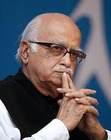L.K. Advani's Blog, page 3
February 15, 2014
UNDER DR. MANMOHAN – SONIA DUO, PARLIAMENT HITS AN ALL TIME LOW
The U.P.A. Government has been in office now for ten years, from 2004 to 2014. UPA I lasted from 2004 to 2009; and UPA II from 2009 to 2014.
Dr. Manmohan Singh began his tenure with a clean personal reputation. But as his decade long tenure is coming to a close, he would leave behind him a record of having presided over the most corrupt government in Independent India.
Starting with the scandals that surfaced during the Commonwealth Games in Delhi, then proceeding to the 2 G Spectrum scams, most of the scams that came to light under Congress governments were exposures made by the C.A.G. or the judiciary and related to bribes allegedly received by ministers/officials in government for illegal favours extended to the bribe givers.
But I hold that the most disgraceful scam that came to light during UPA I was the Cash-for-Votes Scam. It was an episode following the Left Front’s withdrawal of support to the U.P.A. Government in protest against the UPA striking a deal with Washington on the nuclear issue.
With this development, Dr. Manmohan Singh’s Government came face to face with a grave crisis and had to face a confidence vote in which it could have well been ousted.
It was at this point that a set of India-related diplomatic cables on the Indo-U.S. nuclear deal were released by the Whistle-blowing website WIKILEAKS, and reproduced by India’s own Chennai based reputed Daily, THE HINDU.
The Reuters reported about this episode thus :
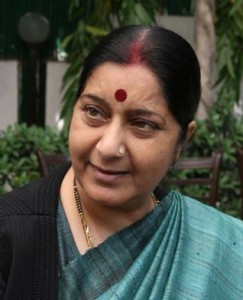 “The secret U.S. state department cable obtained by WikiLeaks and published by The Hindu newspaper on Thursday details a conversation between a senior Congress party member and a U.S. Embassy official surrounding the payment of almost $9 million by a government facing a crucial confidence vote to members of a regional political party to secure their support..
“The secret U.S. state department cable obtained by WikiLeaks and published by The Hindu newspaper on Thursday details a conversation between a senior Congress party member and a U.S. Embassy official surrounding the payment of almost $9 million by a government facing a crucial confidence vote to members of a regional political party to secure their support..
Leader of the Opposition Sushma Swaraj, who has in recent months led a scathing attack on the Congress party-led coalition government for failing to tackle corruption in India, posted on Twitter: “The wikileaks details in today’s Hindu about payoffs to MPs are shocking. I will raise this issue in Parliament today.”
Both houses of parliament were adjourned after uproar over the cable’s contents.
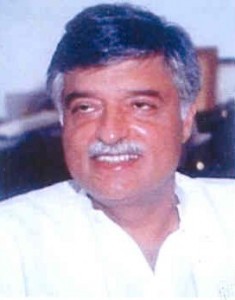 The cable details a conversation between an aide of Satish Sharma, Congress party MP and close associate of party chief Sonia Gandhi, and, U.S. Charge d’affaires Steven White in which the aide states that four MPs belonging to the Rashtriya Lok Dal (RLD) party had been paid 100 million rupees ($2.2 million) each in order to secure their support for the government in a tight confidence vote over the Congress party’s support of a nuclear deal between India and the U.S.
The cable details a conversation between an aide of Satish Sharma, Congress party MP and close associate of party chief Sonia Gandhi, and, U.S. Charge d’affaires Steven White in which the aide states that four MPs belonging to the Rashtriya Lok Dal (RLD) party had been paid 100 million rupees ($2.2 million) each in order to secure their support for the government in a tight confidence vote over the Congress party’s support of a nuclear deal between India and the U.S.
White, who authored the secret cable, described how Embassy staff were shown two chests containing 500-600 million rupees ($ 11-13 million) that had been earmarked for “use as pay-offs.”
Three BJP MPs along with my aide Shri Sudheendra Kulkarni , were involved in an operation to expose the Scam. They had contacted a TV channel to prepare Videos of the bribery episode. The Government’s response was to put all of them behind bars. When later Shri Narottam Kaushal pronounced judgement in their case acquitting them, his opening paragraph read :
July 22, 2008 was a black letter day in the history of Indian Parliament. Three members of Parliament namely Ashok Argal, Faggan Singh Kulaste and Mahabir Singh Bhagora placed on the table of Parliament currency notes for the amount of Rs. One Crore, when the House was debating on Motion of Confidence. It was claimed that the money had been offered to them in connection with the voting. Speaker of the House after discussions with senior Parliamentarian asked the aforesaid three MPs to put-in a written complaint. Before a formal complaint could be submitted by the aforesaid three MPs, a communication dated 23.07.2008 was received by the Speaker, from Rajdeep Sardesai, Editor in Chief of CNN-IBN Network. He enclosed five video tapes along with his communication. Formal complaint dated 25.07.2008 addressed to Hon’ble Speaker, Lok Sabha was submitted by the three MPs, alleging that they were sought to be bribed by the leaders of Congress and Samajvadi Party to help the Government, by refraining from voting against confidence motion.
When I came to know of the arrest of the three MPs of my party as also of associates like Shri Kulkarni, I sought permission from the Hon’ble Speaker of the Lok Sabha to make a brief submission before any other business was taken up. Somewhat angrily I said that a horrible crime was sought to be committed, and MPs given crores of rupees to bribe them to support the Government. These BJP MPs did not take the bribe home and instead, acting as whistle blowers came straight to Parliament and placed the money on the Table of the House. World over, in democracies, Whistle-blowers are hailed, and here they have been jailed! I as their leader would like to tell Government if they think these colleagues of mine have done anything illegal I wish to tell those in authority they have done so with my permission to expose the dirty scam. I dare the Government to put me also into prison I along with these MPs.
No less shameful for the prestige and reputation of the Indian Parliament than this Cash-for-Episode Scam that occurred in UPA I’s time is the ugly scenes witnessed under UPA II. Under Vajpayee ji the N.D.A. divided three major States - Madhya Pradesh, Uttar Pradesh and Bihar and created three new States - Chhattisgarh, Uttarakhand and Jharkhand without even a ripple of disturbance. With the present Government, session after session has had to be adjourned due to chaos created over Telangana between the supporters and opponents of division.
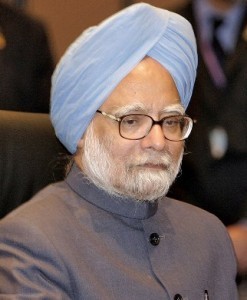
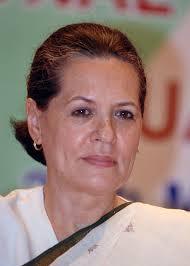 In fact, the session presently on has on this issue of Telangana precipitated scenes last week which made the Prime Minister Dr. Manmohan Singh declare “My heart bleeds when I watch such scenes on the floor of Parliament.” Most members were shocked one day to see as many as half a dozen Ministers of the present Government totally disregarding the presence of Prime Minister Dr. Manmohan Singh and Congress Party Chairperson Smt. Soniaji in the House, rush into the well of the House and join the ugly ruckus that was taking place, when amidst shouting of slogans for and against division of Andhra Pradesh, parliamentary papers were being torn and thrown all around. This happened on Wednesday February 12.
In fact, the session presently on has on this issue of Telangana precipitated scenes last week which made the Prime Minister Dr. Manmohan Singh declare “My heart bleeds when I watch such scenes on the floor of Parliament.” Most members were shocked one day to see as many as half a dozen Ministers of the present Government totally disregarding the presence of Prime Minister Dr. Manmohan Singh and Congress Party Chairperson Smt. Soniaji in the House, rush into the well of the House and join the ugly ruckus that was taking place, when amidst shouting of slogans for and against division of Andhra Pradesh, parliamentary papers were being torn and thrown all around. This happened on Wednesday February 12.
The limits of unsavory behavior were crossed the next day when apart from a repeat performance of the previous day a Congress Party MP pulled out a black pepper spray and started spraying it all around so that several MPs including Smt. Sushma Swaraj had tears in her eyes, and many others were seen coughing in acute discomfort.
TAIL PIECE
Some of the Headlines in the Capital’s dailies on February 14.
The Statesman
PARLIAMENT DISGRACED
The Times of India
Pepper Spray in House leaves Indian democracy in tears
Hindustan Times
Parliament Attacked, This time by MPs
The Pioneer
THE DARKEST DAY
THE HINDU
MPs make it a day of shame for Parliament
L.K. Advani
New Delhi
16 February, 2014

February 10, 2014
कैसे राष्ट्रीय स्वयंसेंवक संघ से जुड़ने ने मेरे जीवन को सार्थकता प्रदान की
गत् सप्ताह 2 फरवरी को खुशवंत सिंहजी ने अपने अत्यन्त सक्रिय जीवन के निनयान्वें वर्ष पूरे किए। इस अवसर पर मैं, सुजान सिंह पार्क स्थित उनके आवास पर गया और ‘माई टेक‘ (My Take½ शीर्षक से प्रकाशित अपने ब्लॉगों के संग्रह की दूसरी पुस्तक उन्हें भेंट की, जिसका लोकार्पण सरसंघचालक श्री मोहनराव भागवत ने किया था। यह लोकार्पण कार्यक्रम फिक्की सभागार में हुआ जिसकी अध्यक्षता लोकसभा में नेता प्रतिपक्ष श्रीमती सुषमा स्वराज ने की थी। पूज्य बाबा रामदेवजी ने भी कार्यक्रम को संबोधित किया था। पुस्तक पर मेरे हस्ताक्षरों के साथ इस महान लेखक को इन शब्दों में सम्मानपूर्वक प्रणाम अंकित था: सौवें वर्ष में प्रवेश करने पर सरदार खुशवंत सिंह का अभिनन्दन।
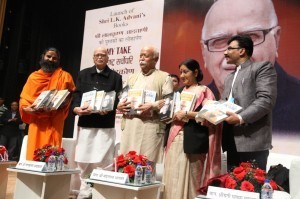
उस शाम उनके घर पर कोई औपचारिक कार्यक्रम नहीं था। वहां खुशवंत सिंहजी के पारिवारिक सदस्यों और मित्रों के एक छोटे से समूह का अनौपचारिक मिलन था। उनमें से एक कलाकार थे, गुजरात के वृंदावन सोलंकी। अपने ‘पैड‘ पर उन्होंने पैसिंल से कुछ ही मिनटों में उस शाम के मुख्य अतिथि का रेखाचित्र ऊकेर दिया। खुशवंत सिंहजी के सुंदर रेखाचित्र से प्रभावित मेरे सहयोगी दीपक चोपड़ा ने सोलंकी से पूछा कि क्या वह ऐसा ही रेखाचित्र मेरा भी बना सकते हैं। कलाकार ने तुरंत बना कर दिया। दोनों रेखाचित्र इस ब्लॉग में दिए गए हैं।
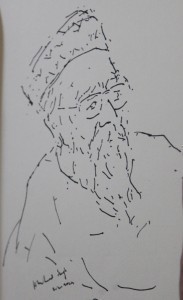
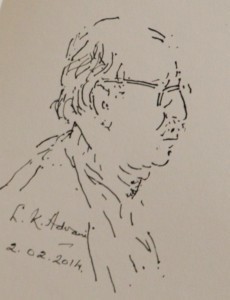
जब 1942 में, मैं राष्ट्रीय स्वयंसवेक संघ का स्वयंसेवक बना और वह भी सिंध में, तब वहां बहुतों ने इस संगठन का नाम भी नहीं सुना था।
मेरी जीवनी ‘मेरा देश, मेरा जीवन‘ के पहले चरण के अध्याय 3 का शीर्षक है: ”सिंध में मेरे पहले बीस वर्ष”ए इसके जिस अनुच्छेद में राष्ट्रीय स्वयंसेवक संघ से मेरे जुड़ने का उल्लेख है, वह निम्न है:
”हर एक बचपन में एक क्षण ऐसा आता है जब दरवाजा खुलता है और भविष्य प्रवेश करता है। मेरे मामले में भविष्य में दाखिल होने का वह क्षण अचानक खेल-खेल में ही आ गया, जब मैंने राष्ट्रीय स्वयंसेवक संघ में प्रवेश लिया। उस समय मैं चौदह वर्ष और कुछ महीने का था। मेरे मैट्रिकुलेशन करने के बाद मेरे पिता कराची से हैदराबाद (सिंध) आ गए थे। कॉलेज में प्रवेश लेने से पहले गरमी की छुट्टियों में मैंने टेनिस खेलना शुरु कर दिया। टेनिस कोर्ट में मेरे नियमित जोड़ीदारों में से एक मेरा मित्र था मुरली मुखी, जो मेरी ही उम्र का था। एक दिन ठीक खेल के बीच वह बोला, ‘मैं जा रहा हूं।‘ बड़े आश्चर्य से मैंने उससे पूछा तो वह बोला, ‘कुछ दिन पहले मैं आर.एस.एस. का स्वयंसेवक बन गया हूं। मैं शाखा में देर से नहीं पहुंच सकता, क्योंकि उस संगठन में समय की पाबंदी अत्यंत आवश्यक है।‘
मेरी पुस्तक की कुछ समीक्षाओं में मेरे संस्मरणों के अंतिम अध्याय को (अध्याय 18, उपसंहार से पहले) सर्वोत्तम वर्णित किया गया है। इस अध्याय का शीर्षक है: ”जीवन में सार्थकता एवं सुख की खोज”। इस अध्याय का संदर्भ एक अत्यंत दिलचस्प रोमहर्षक उपन्यास ‘दि इंटरप्रिटेशन ऑफ मर्डर से लिया गया है, जिसे अमेरिका के येल विश्वविद्यालय के विधि प्रोफेसर जेड रुबेनफेल्ड ने लिखा है। लेखक लिखते हैं ” सुख का कोई रहस्य नहीं है। सभी दु:खी व्यक्ति एक जैसे ही होते हैं। बहुत समय पहले कोई मन को चोट लगी हो, कोई इच्छा पूरी न हुई हो, अहम को ठेस पहुॅची हो, प्रेम का नव अंकुर जिसका मजाक उड़ाया गया हो-या इससे भी बदतर, उनके प्रति उदासीनता दिखाई गई हो-ये उन दु:खी व्यक्तियों से चिपके रहते हैं, या वह उनसे चिपका रहता है। और इस तरह दु:खी व्यक्ति हर दिन गुजरे जमाने की यादों में बिताता है। लेकिन प्रसन्न व्यक्ति कभी भी पीछे मुड़कर नहीं देखता, और न ही वह आगे की सोचता है। वह तो सिर्फ वर्तमान में ही जीता है। लेकिन इसी में तो अड़चन है। ”वर्तमान कभी भी एक चीज नहीं दे सकता: सार्थकता। सुख और सार्थकता दोनों का एक मार्ग नहीं होता। सुख पाने के लिए मनुष्य को केवल वर्तमान में रहना होता है: उसे केवल उस क्षण के लिए जीना होता है। लेकिन यदि वह सार्थकता चाहता है-अपने स्वप्नों की, अपने रहस्यों की, अपने जीवन की सार्थकता-तो मनुष्य को अपने अतीत में पुन:प्रवेश करना होगा, भले ही वह कितना भी अंधकारमय क्यों न रहा हो; और उसे भविष्य के लिए जीना होगा, भले वह कितना ही अनिश्चित हो। इस प्रकार, प्रकृति हम सबके सामने सुख और सार्थकता का विकल्प रखती है, इस आग्रह के साथ कि हम दोनों में से किसी एक को चुन लें।”
जहां तक मेरा सवाल है, मैंने सार्थकता को चुना है।
यद्यपि इस उपन्यास में दावा किया गया है कि मनुष्य को जीवन में या तो सार्थकता प्राप्त होगी या सुख; लेकिन मेरा यह सौभाग्य है कि मुझे दोनों ही भरपूर मात्रा में मिले हैं।
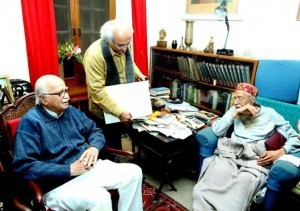
मेरे साथ चित्रकार सोलंकी और खुशवंत सिंहजी
जब मैं अपने जीवन के आठ दशकों का सिंहावलोकन करता हूं तो मुझे स्मरण आता है कि मैंने अपने जीवन की सार्थकता हैदराबाद (सिंध) के टेनिस कोर्ट में पाया, सन् 1942 में जब मैंने पहली बार राष्ट्रीय स्वयंसेवक संघ का नाम सुना और स्वयंसेवक बना। मुझे तब सार्थकता लगी जब मैंने कराची में स्वामी रंगानाथन के भगवद् गीता के प्रवचन रविवार की शाम को सुनने शुरु किए। मैंने सार्थकता तब पायी जब मैं घर और परिवार छोड़कर राष्ट्रीय स्वयंसेवक संघ के प्रचारक के रुप में काम शुरु किया, पहले कराची में और बाद में विभाजन के फलस्वरुप विस्थापित होने पर राजस्थान में। यह सार्थकता और परिष्कृत तब हुई जब मैंने पचपन वर्ष पूर्व भारतीय जनसंघ और बाद में भारतीय जनता पार्टी के कार्यकर्ता के रुप में राजनीतिक यात्रा शुरु की। यह यात्रा अभी समाप्त नहीं हुई है। साढ़े चौदह वर्ष की आयु से आज तक मेरे जीवन का एक कर्तव्य है: अपनी मातृभूमि की सेवा करना।
मैं अक्सर मुंबई से प्रकाशित आफ्टरनून डिस्पैच एण्ड कूरियर‘ को दिए उस साक्षात्कार को उदृत करता हूं जिसमें प्रकाशन की ओर से 20 समान प्रश्न पूछे गए थे और उस पर आधारित अत्यन्त रोचक एवं सजीव समाचार तैयार किया गया। एक प्रश्न था ”मि. आडवाणी, आपकी सबसे बड़ी कमजोरी क्या है?” मेरा तत्काल उत्तर था: ”पुस्तकें; और सामान्य स्तर पर चॉकलेट्स”।
इसी साक्षात्कार के चलते मेरे जन्मदिवस अथवा एसे किसी अन्य खुशी के मौके पर मुझसे मिलने आने वाले लोग पुस्तकें लेकर आते हैं जिससे मेरे निजी पुस्तकालय में इजाफा होता जा रहा है।
वस्तुत: खुशवंत सिंह द्वारा लिखित खुशवंतनामा पुस्तक मुझे फरवरी, 2013 में मिली जिसने मुझे स्मरण कराया कि इस अत्यंत पठनीय पुस्तक पर मैंने अपना एक ब्लॉग ”अद्भुत लेखक:विचार प्रेरक पुस्तक” शीर्षक से लिखा। यह पुस्तक उन्होंने तब लिखी जब उन्होंनें निनयान्वें वर्ष में प्रवेश किया। अपने ब्लॉग में मैंने लिखा था ”मैंने किसी और अन्य लेखक को नहीं पढ़ा जो सुबोधगम्यता के साथ-साथ इतना सुंदर लिख सकता है और वह भी इस उम्र में।”
खुशवंत सिंह अनेक वर्षों से हिन्दुस्तान टाइम्स में स्तम्भ लिखते रहे। फरवरी 2013 में जब मैं उनसे मिला तो उन्होंने 17 मार्च के हिन्दुस्तान टाइम्स में मेरे बारे में लिखा: ”जब उन्होंने (आडवाणी) सोमनाथ से अयोध्या की रथयात्रा शुरु की और बाबरी मस्जिद के ध्वंस को देखने के बाद मैं उनका घोर आलोचक रहा हूं। एक सार्वजनिक सभा जिसे वह सम्बोधित करने वाले थे, में मैंने उनके सामने ही उनके प्रति कठोर शब्दों का उपयोग किया।” इसी प्रकार उन्होंने मेरे द्वारा उनके घर जाने के बारे में, लिखा: ”मेरे इस डर के पर्याप्त कारण मौजूद थे कि वह मुझे निशाना बनाकर कहेंगे कि जाओ जहन्नुम में …लेकिन ऐसा करने के बजाय, वह मेरे और मेरी बेटी के लिए गुलाब के फूलों का गुलदस्ता लेकर आए। मुझे स्वीकार करना पड़ा कि वह मुझसे ज्यादा अच्छे सिख हैं। वह आमिल सिंधी समुदाय से हैं जो सिख परम्पराओं को मानते हैं। हम विभिन्न विषयों पर लगभग एक घंटे तक बातचीत करते रहे लेकिन उन्होंने अपनी रथयात्रा और बाबरी मस्जिद के ध्वंस के बारे में कोई उल्लेख नहीं किया। यह पूरी तरह से एक शिष्टाचार भेंट थी यह पुष्ट करने के लिए कि मतभेदों के बावजूद हमारे सम्बन्ध सौहार्दपूर्ण हैं। जैसा मैं सोचता था, वह उससे बड़े इंसान हैं।”
केवल एक उदार और सहृदय तथा दरियादिल रखने वाला व्यक्ति ही इतनी सुगमता से उस दूसरे के प्रति अपनी घृणा भूल सकता है, जिसके एक कदम से वह घोरे असहमत थे जैसाकि मेरे सम्बन्ध में (रथयात्रा)
टेलपीस (पश्च्यलेख)
आज का ब्लॉग राष्ट्रीय स्वयंसेवक संघ और खुशवंत सिंह के बारे में है। इससे मुझे नवम्बर 1972 में प्रतिष्ठित इलेस्ट्रेटिड वीकली ऑफ इण्डिया के सम्पादक के रुप में खुशवंत सिंह द्वारा राष्ट्रीय स्वयंसेवक संघ के तत्कालीन सरसंघचालक श्री माधवराव सदाशिवराव गोलवलकर (श्री गुरुजी) से लिए गए साक्षात्कार का स्मरण हो आया।
यह एक सकारात्मक साक्षात्कार था। लेकिन खुशवंत सिंह ने उस दिन अपने लेख की शुरुआत निम्नलिखित शब्दों से की:
कुछ ऐसे व्यक्ति होते हैं जिनके बारे में जाने बिना हम उनसे घृणा करना शुरु कर देते हैं। ऐसे व्यक्तियों की मेरी सूची में सर्वप्रथम गुरु गोलवलकर आते हैं।”
खुशवंत सिंह ने राष्ट्रीय स्वयंसेवक संघ प्रमुख से पूछा: मुस्लिम मुद्दों पर आपके क्या विचार हैं?
श्री गुरुजी का उत्तर था: ”मुझे तनिक भी संदेह नहीं है कि ऐतिहासिक कारण ही अकेले मुस्लिमों की भारत और पकिस्तान के प्रति विभाजित वफादारी के लिए ही जिम्मेदार हैं। इसके अलावा मुस्लिम और हिन्दू ही इसके लिए समान रुप से दोषी ठहराए जाएंगे।
वैसे भी कुछ लोगों के दोष के लिए समूचे समुदाय को जिम्मेदार ठहराया जाना सही नहीं है। हमें मुस्लिमों की निष्ठा प्यार से जीतनी होगी। मैं आशावादी हूं और मैं मानता हूं कि हिन्दुत्व और इस्लाम एक-दूसरे के साथ रहना सीखेंगे।
लालकृष्ण आडवाणी
नई दिल्ली
9 फरवरी, 2014

February 8, 2014
HOW ASSOCIATION WITH RSS HAS GIVEN MEANING TO MY LIFE
Last week, on February 2nd, Khushwant Singhji completed ninety nine years of his very active life. That day, I called on him at his Sujan Singh Park residence and presented to him the second compilation of my blogs, released by Sar Sangh Chalak Shri Mohan Rao Bhagwat with the title “MY TAKE”. The Book-Release function held at the FICCI Auditorium was presided over by Smt. Sushma Swaraj, Leader of the Opposition in the Lok Sabha. Pujya Baba Ramdevji also addressed the gathering. Inscribed on the book over my signature were my respectful Pranams to the great writer in these words: “Salutations to Sardar Khushwant Singh on his Entry into his Centenary Year”

There was no formal function at the house that evening. It was a very informal get-together of a small group of Khushwantji’s family members and friends. One of them was an artist from Gujarat, named Vrindavan Solanki. With a few pencil strokes of his on a pad he was carrying, in a few minutes he drew a neat sketch of the evening’s Star Guest. Khushwantji’s impressive sketch tempted my associate Deepak Chopra to ask Solanki if he could do a similar one of mine. The artist readily obliged. Both the sketches are being depicted with this blog.


When in 1942, I became a member of the RSS, and that too in Sind, not many in that province had even heard the name of this organization.
In my autobiography, titled My Country, My Life, Chapter 3, of Phase I, is captioned “My First Twenty years in Sindh”. The portion referring to my entry into the RSS reads :
“There is always one moment in childhood, it is said, ‘when the door opens and lets the future in’. In my case, that moment of stepping into the future came, unexpectedly at a playful moment. When I joined the RSS, I was only fourteen years and a few months old then. After I completed my matriculation, my father shifted base from Karachi to Hyderabad (Sindh). During my vacation and before joining college, I started playing tennis. One of my regular partners on the tennis court was a friend, Murli Mukhi. One day, right in the middle of the game, he said, ‘I am going’. Utterly surprised, I asked him, ‘How can you go like this, without even completing the set?’ He replied, ‘I have joined the RSS a few days ago. I cannot be late for the shakha because punctuality is very important in that organisation’.
Some reviews of my book have described the last chapter of my memoirs (Chapter 18, just before the Epilogue) as the best one. The Chapter carries the title “In pursuit of Meaning and Happiness in Life”. The context for this chapter is provided by an acclaimed thriller, “The Interpretation of Murder”, written by Jed Rubenfeld, a law professor at Yale University, U.S.A. The author writes: “There is no mystery to happiness. Unhappy men are all alike, some wound they suffered long ago, some wish denied, some blow to pride, some kindling spark of love put out by scorn – or worse, indifference – cleaves to them, or they do to it, and so they live each day within a shroud of yesterdays. The happy man does not look back. He doesn’t look ahead. He lives in the present. But there’s the rub.
“The present can never deliver one thing: meaning. The ways of happiness and meaning are not the same. To find happiness, a man need only live in the present: he need only live for the moment. But if he wants meaning – the meaning of his dreams, his secrets, his life – a man must reinhabit the past, however dark, and live for the future, however uncertain. Thus, nature dangles happiness and meaning before us all, insisting only that we choose between them.”
For myself, I have chosen meaning.
Although the novel claims that a man can either have meaning or happiness in life, I have had the good fortune of experiencing both, and in abundance.

Artist Solanki is seen above with Khushwantji and me
When I look back at my life of over eight decades, I remind myself that I found my calling in life when, on a tennis court in Hyderabad (Sindh), I first heard the name of Rashtriya Swayamsevak Sangh and became a swayamsevak in 1942. I found meaning when I started attending Sunday evening discourses on the Bhagvad Gita by Swami Ranganathananda in Karachi. I found meaning when I left my home and family to work as a pracharak of the RSS, first in Karachi and later, after being uprooted by Partition, in Rajasthan. That meaning got further enriched when I embarked on a political journey fifty-five years ago, first as a worker of the Bharatiya Jana Sangh and later of the Bharatiya Janata Party. It is a journey that has not yet ended. From the age of fourteen and a half years till now, only one duty has defined the purpose of my life: to serve my Motherland.
I have often quoted an interview I gave to a Mumbai-based newspaper, Afternoon Despatch and Courier, in which the paper would ask the interviewee 20 standard questions and on that basis publish an extremely interesting and lively write-up. One question was “Mr. Advani, what is your greatest weakness?” My prompt reply was “Books; at a grosser level, chocolates”.
It is this interview that has been prompting people who come to greet me on my birthday or any such happy occasion to keep adding to my personal library, which is now sizable.
Indeed, it was a book titled Khushwantnama by Khushwant Singh, received by me in February, 2013 which reminded me of the fact that this highly readable book of his on which I had written a blog titled “Amazing Author: Thought provoking book” had been written by him when he was aged ninety eight years. I called on him to compliment him on his book when he had entered his ninety ninth year. In my blog I wrote, “I have not read any other author who could write as well, and with such lucidity, at such an advanced age.”
Khushwant Singh has been writing a column for the Hindustan Times for many years. After I called on him in February, 2013, he wrote about me in the H.T. dated March 17: “After he (Advani) led his Rath Yatra from Somnath Temple to Ayodha and watched the Babri Masjid being pulled down I have been one of his severest critics. I used harsh words for him on his face at a public meeting he was to address.” So, about my visit to his residence, he wrote: “I had reason to fear that he wanted to tick me off and tell me to go to hell… Instead of ticking me off, as I expected, he brought a bouquet of roses for me and my daughter. I had to concede he was better Sikh than I am. He is an Amil Sindhi, a community that subscribes to Sikh tenets. We spent an hour talking about different things but did not refer to his rath yatra and the destruction of Babri Masjid. It was entirely a courtesy call to reaffirm that despite differences we were on amicable talking terms. He is a bigger man that I thought he was.”
Only a liberal and generous and earnestly large hearted person can so readily shed his aversion to another, one of whose actions he had so strongly disapproved earlier as he did mine (rath yatra).
TAIL PIECE
Today’s blog is about the RSS, and about Khushwant Singh. It reminds me about an interview Khushwant Singh, as Editor of the prestigious Illustrated Weekly of India did with the RSS Chief Shri M.S. Golwalkar (Shri Guruji) way back in November 1972.
This was a very positive interview. But Khushwant opened his write up that day with the following words:
“There are some individuals whom we start to hate without even bothering to know about them. Guru Golwalkar comes first on my list of such persons.”
Khushwant Singh asked the RSS Chief : What are your thoughts on Muslim issues?
Shri Guruji replied : “I have not the slightest doubt that historical factors alone are responsible for the divided loyalty that Muslims have towards India and Pakistan. Moreover both Muslims and Hindus are equally to blame for this:
Nevertheless it is not right to hold the entire community responsible for the guilt of some people. We have to win over the loyalty of Muslims with love. I am optimistic and I believe that Hindutva and Islam will learn to co-exist with one another.”
L.K. Advani
New Delhi
09 February, 2014

December 25, 2013
रफीक जकरिया ने तोड़ा भ्रम कि सरदार मुस्लिम विरोधी थे
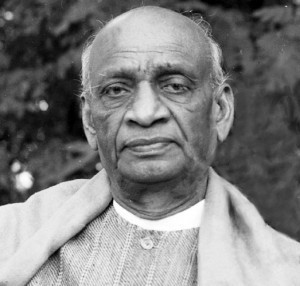 मुझे यह देखकर प्रसन्नता हुई कि ताजा राजनीतिक इतिहास से संबन्धित मेरे ब्लॉगों से, सामान्य तौर पर कहा जाए तो मीडिया में भी बहस छिड़ी। इस वर्ष मेरे द्वारा लिखे गए देसी रियासतों के एकीकरण से सम्बन्धित ब्लॉगों जिनमें स्वाभाविक रुप से सरदार पटेल तथा वी.पी. मेनन का जिक्र था, से ज्यादा बहस छिड़ी। इनमें से कुछ ने सरदार के पण्डित नेहरु से मतभेदों की ओर सीधा ध्यान आकर्षित किया।
मुझे यह देखकर प्रसन्नता हुई कि ताजा राजनीतिक इतिहास से संबन्धित मेरे ब्लॉगों से, सामान्य तौर पर कहा जाए तो मीडिया में भी बहस छिड़ी। इस वर्ष मेरे द्वारा लिखे गए देसी रियासतों के एकीकरण से सम्बन्धित ब्लॉगों जिनमें स्वाभाविक रुप से सरदार पटेल तथा वी.पी. मेनन का जिक्र था, से ज्यादा बहस छिड़ी। इनमें से कुछ ने सरदार के पण्डित नेहरु से मतभेदों की ओर सीधा ध्यान आकर्षित किया।
देश में प्रकाशित होने वाले अंग्रेजी दैनिकों में से, चेन्नई के ‘दि हिन्दू‘ समूह को सामान्य तौर पर मैं विवेकी और संतुलित मानता हूं-चाहें वह समाचारों का प्रस्तुतीकरण हो या इसके सम्पादकीय और लेखों का चयन का संदर्भ हो। चाहें यह मेरी पार्टी के रुख से एकदम भिन्न हों या जिन्हें मैं भी सही नहीं मानता जितना कि इस समूह को मानता हूं। अत: इसलिए जब मैंने फ्रंटलाइन (13 दिसम्बर, 2013) का अंक देखा तो मैं आश्चर्य चकित रह गया, इसके आवरण पर पण्डित नेहरु और सरदार पटेल का फोटोग्राफ था, जिस पर टिप्पणी है: ”ऐतिहासिक साक्ष्य बताते हैं कि सरदार वल्लभभाई पटेल साम्प्रदायिक दृष्टिकोण वाले व्यक्ति और जवाहरलाल नेहरु सेक्युलर राष्ट्रवाद के प्रतीक। यही स्पष्ट करता है कि क्यों संघ परिवार एक को पूजता है और दूसरे से घृणा करता है।”
कम से कम, मैं दि हिन्दू समूह की किसी पत्रिका से कभी यह अपेक्षा नहीं करता था वे सरदार पटेल को ”एक नितांत साम्प्रदायिक दृष्टिकोण वाले व्यक्ति” के रुप से वर्णित करेंगे। जब मैंने पत्रिका को खोला तो मैंने पाया कि यह लेख ए.जी. नूरानी ने लिखा है। इसलिए मुझे आश्चर्य उसके लेखक को लेकर नहीं परन्तु ऐसे विकृत लेख को आवरण कथा बनाने पर हुआ।
जब दिसम्बर 1950 में सरदार पटेल का निधन हुआ तब वह न केवल उपप्रधानमंत्री और केंद्रीय मंत्रिमंण्डल में गृहमंत्री थे, अपितु वह सूचना एवं प्रसारण विभाग के भी प्रभारी थे। तब तक दूरदर्शन का जन्म नहीं हुआ था। उस समय आल इण्डिया रेडियो ही एकमात्र सरकारी संचार माध्यम था। आल इण्डिया रेडियो ने वार्षिक सरदार पटेल स्मारक भाषणमाला की शुरुआत की।
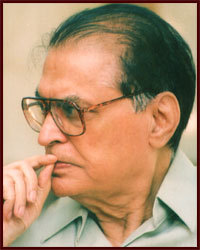 सन् 1956 में जब रफीक जकरिया से इस कड़ी में भाषण देने हेतु सम्पर्क किया गया तो विषय रखा गया ”सरदार पटेल और भारतीय मुस्लिम”। इन भाषणों पर आधारित पुस्तक की अपनी प्रस्तावना में जकरिया लिखते हैं:
सन् 1956 में जब रफीक जकरिया से इस कड़ी में भाषण देने हेतु सम्पर्क किया गया तो विषय रखा गया ”सरदार पटेल और भारतीय मुस्लिम”। इन भाषणों पर आधारित पुस्तक की अपनी प्रस्तावना में जकरिया लिखते हैं:
”जो विषय मैंने चुना वह कुछ विवादास्पद था; सर्वप्रथम मैं इसके बारे में थोड़ा-बहुत आशंकित था। एक विद्यार्थी और भारतीय राजनीति में भाग लेने वाले के रुप में मुझे सरदार पटेल के जीवन और विभिन्न क्षेत्रों में उनकी ऐतिहासिक उपलब्धियों के बारे में काफी जानकारी थी। लेकिन मेरे जैसे अनेक हम-मजहबों की भांति मेरी भी यह धारणा बनी हुई थी कि वह मुस्लिमों को पसन्द नहीं करते थे; वास्तव में, मैं सोचता था कि वह घोर मुस्लिम विरोधी थे। इसलिए मुझे लगा कि क्या मुझे उनकी स्मृति में आयोजित ऐसे विषय पर भाषण देना चाहिए जो उनके प्रति आलोचनात्मक भी हो सकता है। मैंने अपने मित्र एस. रामाकृष्णन से परामर्श किया जो सरदार को घनिष्टता से जानते थे; अहमदनगर किले की कारावास से 15 जून, 1945 को रिहा होने के बाद ऐतिहासिक कैबिनेट मिशन, जिसके फलस्वरुप सत्ता का हस्तांतरण हुआ और सरदार द्वारा उप प्रधानमंत्री पद संभालने के बाद और दिल्ली में रहना शुरु करने के कुछ महीनों बाद उन्होंने सरदार के निजी सचिव के रुप में काम किया था। वह के.एम. मुंशी के मूल्यवान सहयोगी थे और भारतीय विद्या भवन के संस्थापक की मृत्यु के बाद उन्होंने न केवल भारत अपितु दुनिया के विभिन्न भागों में भी इसको ठोस आधार देते हुए इसका विस्तार किया। उनका जीवन स्वयं में एक काव्य जैसा रहा, उनका जीवन राष्ट्रीय एकात्मता के लिए मूक और समर्पित ढंग से काम करने की गाथा है। उन्होंने मुझे इस विषय पर बोलने हेतु तैयार करने में निर्णायक भूमिका निभाई क्योंकि उन्हें लगा कि सत्य बताया ही जाना चाहिए, चाहे इसके परिणाम कुछ भी हों, वह आश्वस्त थे कि पटेल इसमें से बेदाग निकलेंगे।
जितना ज्यादा मैंने खोज की उतना ही ज्यादा मैं आश्वस्त हुआ कि लौह पुरुष को अनेक संदर्भों में गलत समझा गया और भारतीय मुस्लिमों के बारे में उनके रुख के बारे में जो मकड़जाल फैला हुआ है, उसे हटाए जाने की जरुरत है। मुझे खुशी है कि मैं अपने संतोष मुताबिक यह कर पाया।
भारत के पूर्व सॉलिसिटर जनरल, फली नरीमन ने मुझे लिखा कि उन्हें मेरे भाषण को सुनकर आनन्द आया; इसी प्रकार मुंबई उच्च न्यायालय के मान्य न्यायाधीश चपलगांवकर ने भी लिखा। अन्य अनेकों ने भी महसूस किया कि भारतीय मुस्लिमों के प्रति पटेल के रवैये का निष्पक्ष विश्लेषण कर पाने में मैं सफल रहा, जोकि वर्तमान में साम्प्रदायिक विष से दूषित वर्तमान हालत को ठीक करने हेतु आवश्यक है।
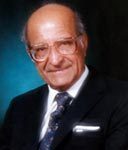 भारतीय विद्या भवन ने रफीक जकरिया द्वारा सरदार पटेल स्मृति व्याख्यानमाला में दिए गए दोनों भाषणों की एक पुस्तक प्रकाशित की है। पुस्तक सन् 1996 में प्रकाशित हुई और इसका शीर्षक है: ”सरदार पटेल एण्ड इण्डियन मुस्लिमस्।”
भारतीय विद्या भवन ने रफीक जकरिया द्वारा सरदार पटेल स्मृति व्याख्यानमाला में दिए गए दोनों भाषणों की एक पुस्तक प्रकाशित की है। पुस्तक सन् 1996 में प्रकाशित हुई और इसका शीर्षक है: ”सरदार पटेल एण्ड इण्डियन मुस्लिमस्।”
पुस्तक में नानी पालखीवाला द्वारा लिखित प्राक्कथन भी है, इसमें पालखीवाला लिखते हैं:
”मैं डा. रफीक जकरिया को भारत सरकार द्वारा प्रायोजित सरदार पटेल स्मृति व्याख्यानमाला में दिए गए शोध आधारित उनके भाषणों के आधार पर सुव्यवस्थित ढंग से लिखी गई पुस्तक के माध्यम से सरदार वल्लभभाई पटेल की स्मृति को पुन: जीवित करने के सर्वाधिक उपयुक्त कार्य हेतु बधाई देता हूं। उन्होंने अधिकार पूर्वक उस मिथ को तोड़ दिया है जो निहित स्वार्थी तत्वों ने बना दिया था कि सरदार मुस्लिम विरोधी थे।”
इस पुस्तक में जकरिया ने के.एम. मुशी की पुस्तक एन्ड ऑफ एन इरा‘ का उपयोग करते हुए विस्तार से वर्णन किया है कि कैसे कासिम रिजवी ने निजाम की महत्वाकांक्षाओं को भड़काया और ऐसी स्थिति पैदा की कि जिसमें सरदार पटेल को अंतत हैदराबाद का भारत में विलय करने हेतु सेना का उपयोग करना पड़ा।
जकरिया लिखते हैं:
”हैदराबाद, जोकि सबसे बड़ी रियासत थी, पर महामहिम निजाम का शासन था, जिसकी लगभग 80 प्रतिशत आबादी हिन्दू थी, ने सरकार के सामने जटिल समस्या खड़ी की; इसके शासक द्वारा टालमटोल करने के फलस्वरुप हिन्दू-मुस्लिम रिश्ते और ज्यादा बिगड़े, विशेषकर कासिम रिजवी जैसे अहंकारी अशांति फैलाने वाले भड़काऊ भाषण और अपमानजनक गालियां बकनेवाले, जिसने अपने आप पर ”हिन्दू लूटेरों‘ के शिकंजे से निजामराज को बचाने का जिम्मा ओढ़ रखा था। अपनी जोशीली भाषण शैली से उसने मुस्लिमों पर ऐसा प्रभाव जमा रखा था कि वे उसमें लगभग एक मसीहा देखते थे। उसने पूरी रियासत में अपनी अकड़ और अहंकार तथा डींगों से ऐसा माहौल बना दिया था कि निजाम भी उससे डरता था। के.एम. मुंशी जिन्हें सरदार ने भारत सरकार की ओर से हैदराबाद में एजेंट जनरल बनाकर भेजा था, ने रिजवी की उछल-कूद, मजाक और शरारतों का शब्दश: चित्रण किया है। अपनी पुस्तक एण्ड ऑफ एन इरा‘ में मुंशी ने रिजवी का वर्णन ”एक अथक कार्यकर्ता, यद्यपि जुनूनी” के रुप में करते हुए उसे चालाक बताया है। वह मना सकता था और डरा कर काबू कर सकता था; जब जरुरी हो वह मुस्करा सकता था, परिहास या आकर्षित भी कर सकता था।”
”सत्ता के गलियारों में रिजवी अपनी क्रोधित आंखों और विशेष चाल-ढाल से निजाम को बेवकूफ बनाता रहा। उसने निजाम को अहसास कराया कि उसे भगवान ने उसको तथा उसकी रियासत को बचाने के लिए भेजा है। वह दावे के साथ कहता था: ”वह दिन ज्यादा दूर नहीं जब बंगाल की खाड़ी हमारे निजाम के पांव धोएगी।” आगे कहा कि चांद तारेवाला हरा झण्डा एक बार फिर से दिल्ली के लालकिले पर फहराएगा। एक काबिल ब्रिटिश वकील, वाल्टर मांकटॉन, जो निजाम की तरफ से मांऊटबेंटन की सहायता से भारत के साथ एक सम्मानजनक समझौता कर पाने में लगभग सफल हो गए थे, रिजवी और उसकी मंत्रिपरिषद के मंत्रियों की चालबाजी से इतना परेशान हो गए कि जिन्हें उसने आतंकित किया हुआ था कि वह अपनी सलाह हताशा में देकर लंदन वापस लौट गए। निजाम परस्पर विरोधी दवाबों में फंसा था। उसके पास न तो समझ थी और न ही फैसला करने की इच्छा। वह अपना रुख बार-बार बदल रहा था। एक दिन वह लड़ाई की बात करता तो दूसरे दिन समझौते की। छतारी ने उसे पहले ही चेता दिया था कि न तो पाकिस्तान और न ही ब्रिटेन उसको बचाने के लिए आएगा। तब वह भारत के साथ समझौते के लिए तैयार हो गया। यह सुनते ही रिजवी ने ऐसा भीड़ उन्माद भड़काया कि निजाम ने आनन-फानन में अपना पक्ष वापस ले लिया। एक बार, निजाम ने रिजवी के उग्र भाषण से ऊबकर अपना आपा खो दिया। उसने अपने सलाहकारों को ”उस काले रक्षक और निकृष्ट व्यक्ति को रोकने को कहा जो पागल हो गया है। लेकिन यह अस्थायी था। जैसे ही रिजवी, जो एक भस्मासुर बन चुका था, के चिल्लाकर बोलने के चलते वह उसके सामने शांत हो गया। उसे कोई भी नियंत्रित नहीं कर सका था। उसके भाषणों में हिन्दुओं और भारत के विरुध्द विषवमन से ज्यादा कुछ नहीं था। उसे भरोसा था कि भारतीय मुस्लिम निजाम के साथ एकजुट होकर खड़े होंगे।”
रजाकरों के नाम वाले उसके अनुयायी निर्दोष हिंदुओं का सता रहे थे; उसका संगठन-इत्तेहादुल मुसलमीन का दबदबा था। 31 मार्च, 1948 को निकृष्ट व्यक्ति भारत से लड़ने के लिए शस्त्र और गोला बारुद इक्ठ्ठा करने के लिए उसने एक ”हथियार सप्ताह” आयोजित किया। लंदन के दि टाइम्स में प्रकाशित उसके भाषण में घृणा और जहर भरा था। उसने भारत के विरुध्द युध्द की घोषणा की और और उसने भारतीय मुसलमानों को अपने लिए अतिरिक्त बल के रुप में काम करने को कहा उसने उन्हें अपने अनुयायियों के उदाहरण से सबक लेने को कहा, जिनका ”अद्वितीय पराक्रम और दिलेर दृष्टि” उनका मार्गदर्शन करें। उसने कहा ”आज मैं यहां हूं, और शायद कल न भी रहूं। लेकिन मेरे भाईयों, मैं तुम्हें भरोसा दिलाना चाहता हूं कि यदि आप अपने जीवन और मृत्यु के संघर्ष के बीच में कासिम रिजवी को देखना चाहते हो तो उसे बंजारा की आलीशान इमारतों या लुभावनी चाय पार्टियों में मत देखो, यदि उसे देखना है तो लड़ाई के मैदान में देखो। ”पुलिस एक्शन;; के बाद जब भारतीय सेनाओं ने हैदराबाद में प्रवेश किया तो उन्हें किसी भी प्रतिरोध का सामना नहीं करना पड़ा; उसकी गीदड़ भमकी इतनी फुस्स निकली कि उनका कोई महत्व नहीं रहा। वह पाकिस्तान भाग गया और गुमनामी में मर गया, कोई उसके लिए रोया भी नहीं। पीछे उसके जो साथी रह गए थे, उन्हें उसकी बेवकूफी का दण्ड भुगतना पड़ा”
टेलपीस (पश्च्यलेख)
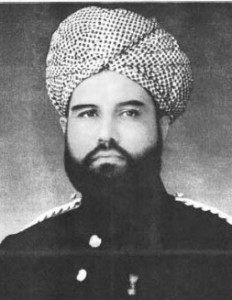 इस पुस्तक में सरदार का कासिम रिज़वी के साथ निर्णायक संवाद इस प्रकार दिया गया है:
इस पुस्तक में सरदार का कासिम रिज़वी के साथ निर्णायक संवाद इस प्रकार दिया गया है:
‘आप क्यों नहीं हैदराबाद को आजाद बने रहने देते‘, रिजवी ने पूछा।
‘मैं सभी संभावित सीमाओं से भी आगे गया हूं। मैंने हैदराबाद के मामले में जो माना है वह किसी और अन्य रियासत के बारे में नहीं स्वीकारा है‘- सरदार का जवाब।
‘लेकिन मैं चाहता हूं कि आप हैदराबाद की दिक्कतें समझें-रिजवी ने जोर दिया।
‘मुझे कोई कठिनाई नहीं है दिखती बशर्ते कि आप पाकिस्तान के साथ कोई समझौता नहीं करते तो‘-सरदार ने जवाब दिया।
‘यदि आप हमारी दिक्कतों को नहीं समझोगे तो हम नही झुकेंगे‘ आवेश में रिजवी ने चिल्लाकर बोला ‘हम लड़ेंगे और हैदराबाद के लिए हमारा आखिरी आदमी तक लड़ेगा।‘
‘यदि आप आत्महत्या करना ही चाहते हैं तो मैं कैसे आप को रोक सकता हूं?’ सरदार का यह शांत और दो टूक जवाब था।
लालकृष्ण आडवाणी
नई दिल्ली
24 दिसम्बर, 2013

December 23, 2013
RAFIQ ZAKARIA DEMOLISHES MYTH THAT SARDAR WAS ANTI-MUSLIM
I am happy to find that my blogs relating to recent political history are, generally speaking provoking a worthwhile discussion in the media also. It happens that of the blogs I have written this year quite a few relate to integration of princely states, and so centre round Sardar Patel and V.P. Menon. Some of these draw pointed attention to the Sardar’s differences with Pandit Nehru.
 Out of the leading English dailies in the country I have generally regarded The Hindu Group of Chennai as reasonable and balanced, both in its news presentation as well as in its editorials and choice of articles. That these may be in sharp variance with my party’s stand or even with my own views does not affect the esteem in which I hold this Group. So I have been surprised to see this month an issue of FRONTLINE (December 13, 2013) which has photographs of Pandit Nehru and Sardar Patel on its cover along with this comment: “Historical record reveals Sardar Vallabhbhai Patel as a man rabidly communal in outlook and Jawaharlal Nehru as symbol of secular nationalism. That explains why the Sangh Parivar worships one and hates the other.”
Out of the leading English dailies in the country I have generally regarded The Hindu Group of Chennai as reasonable and balanced, both in its news presentation as well as in its editorials and choice of articles. That these may be in sharp variance with my party’s stand or even with my own views does not affect the esteem in which I hold this Group. So I have been surprised to see this month an issue of FRONTLINE (December 13, 2013) which has photographs of Pandit Nehru and Sardar Patel on its cover along with this comment: “Historical record reveals Sardar Vallabhbhai Patel as a man rabidly communal in outlook and Jawaharlal Nehru as symbol of secular nationalism. That explains why the Sangh Parivar worships one and hates the other.”
I, for one, would never expect any journal of The Hindu Group to describe Sardar Patel as “a man rabidly communal in outlook.” It is only when I looked inside the journal that I saw that it was an article written by A.G. Noorani. The surprise therefore need not be about its authorship but simply about the fact that such a perverse article should have been made the cover page feature.
When Sardar Patel passed away in December 1950 he was not only Deputy Prime Mnister and Home Minister in the Cabinet, he was also in charge of the Information and Broadcasting portfolio. Doordarshan was not born as yet. All India Radio was at that point of time the only official mass medium in existence. AIR decided to institute the Sardar Patel Lectures, to be held annually.
 In 1956, when Rafiq Zakaria was approached to deliver the Lectures, the subject he chose was “Sardar Patel and Indian Muslims.” In his preface to the book based on these Lectures Zakaria writes:
In 1956, when Rafiq Zakaria was approached to deliver the Lectures, the subject he chose was “Sardar Patel and Indian Muslims.” In his preface to the book based on these Lectures Zakaria writes:
“The subject I chose was rather controversial; at first I was somewhat apprehensive about it. I had, both as a student of and a participant in Indian politics, enough knowledge about the life and times of Sardar Patel and his monumental achievements in different spheres. But like many of my co-religionists, I too was under the impression that he did not like Muslims; in fact, I thought he was unabashedly anti-Muslim. Should I, therefore, I wondered, venture on a theme in lectures organised in his memory, which may be critical of him. I consulted my friend S. Ramakrishnan, who knew the Sardar intimately; he also worked as his Personal Secretary after the Sardar’s release on June 15, 1945, from the Ahmednagar Fort prison, during the historic Cabinet Mission parleys leading to the Transfer of Power and for a few months after the Sardar assumed the office of Deputy Prime Minister and settled down in Delhi. He was a valued colleague of K.M. Munshi and has been mainly responsible, after the founder’s death, for consolidating and expanding Bharatiya Vidya Bhavan not only in India but also in many important places in different parts of the world. A poem in self-effacement, his life has been a saga of quiet and dedicated service to the cause of national integration. He prevailed upon me to take up this subject, because he felt that the truth must be told, whatever the consequences, He was confident that Patel would come out of it unscathed.
The more I researched, the more I was convinced that the iron man had been misunderstood in many respects and there were cobwebs about his attitude towards Indian Muslims, which needed to be removed. I am glad I was able to do so to my satisfaction.
Fali Nariman, former Solicitor General of India, wrote to me that he enjoyed listening to the lectures; so did the Hon’ble Mr. Justice Chapalgaonkar of the Mumbai High Court. Many others also felt that I was able to present an objective analysis of Patel’s attitude to Indian Muslims, which was sorely needed in the present situation which is so vitiated by communal poison.
 Bhartiya Vidya Bhavan has published the book by Rafiq Zakaria based on his two Sardar Patel Memorial Lectures. The book published in 1996 is titled “Sardar Patel and Indian Muslims.”
Bhartiya Vidya Bhavan has published the book by Rafiq Zakaria based on his two Sardar Patel Memorial Lectures. The book published in 1996 is titled “Sardar Patel and Indian Muslims.”
The book contains an Introduction by Nani Palkhivala. In this Palkhivala comments:
“I congratulate Dr. Rafiq Zakaria on his most timely decision to revive the memory of Sardar Vallabhbhai Patel in this well-researched and well-written book based on his Sardar Patel Memorial Lectures, 1996, sponsored by the Government of India. He authentically demolishes the myth built up by vested interests that the Sardar was anti-Muslim.”
In this book Zakaria uses K.M. Munshi’s book End of An Era to describe at some length how Qasim Razvi whetted the Nizam’s ambitions and created a situation in which Sardar Patel finally used the Army to bring about Hyderabad’s integration with India.
Zakaria writes:
Hyderabad, which was the biggest state, with His Exalted Highness the Nizam as its head, and consisting of about 80 per cent Hindus, presented the knottiest problem to the Sardar; the procrastination of its ruler further vitiated Hindu-Muslim relations, especially because of the inflammatory and even abusive utterances of Qasim Razvi, an upstart firebrand, who took upon himself to save the kingdom from the clutches of “the Hindu brigands”. He, with his passionate oratory, had created such a hold on the Muslims that they looked upon him almost as a messiah. He strutted about throughout the state with such arrogance and bluster, that even the Nizam was scared of him. K.M.Munshi, who was sent by the Sardar as the Agent-General to Hyderabad on behalf of the Government of India, has given a picturesque accout of Razvi’s frolics, larks and mischief. In his book The End of an Era, Munshi describes Razvi as “a tireless worker;” though a fanatic, he was cunning. He could persuade and overawe; when necessary, he could smile, be humorous, or exercise charm”.
“The Nizam continued to be duped by Razvi who moved in the corridors of power with fiery eyes and his peculiar gait. He assured the ruler that he had been sent by God to rescue him and his state. He averred, “The day is not far off when the waves of the Bay of Bengal will be washing the feet of our sovereign.” Further, that the green flag with the crescent would fly once again on the Red Fort of Delhi. Walter Monckton, one of the ablest British lawyers, who had almost succeeded with the help of Mountbatten to reach an amicable settlement with the Government of India on behalf of the Nizam, was so fed up with the tactics of Razvi and the council of ministers, who were terrorized by him, that he gave up the brief in sheer disgust and returned to London. The Nizam was caught between contradictory pulls. He had neither the understanding nor the will to decide. He kept shifting his stand. One day he was for confrontation, the other for conciliation. Chhatari had already warned him that neither Pakistan nor Britain was prepared to come to his rescue. He then leaned towards a settlement with India. On hearing of it, Razvi whipped up such mob frenzy that the Nizam hurriedly backed out of his commitment. Once, the Nizam lost his cool, weary of Razvi’s harangues. He asked his councilors to stop “that blackguard, that hapenny-tuppenny man, who has gone mad”. But it was a temporary outburst. He surrendered as soon as Razvi, who had grown into a Frankenstein, thundered and shrieked; he could not be subdued by anyone. His speeches contained nothing but tirades against Hindus and India. He was confident that the Indian Muslims would rise to a man to stand by the Nizam.’
His followers, known as Razakars harassed innocent Hindus; his organization, called Ittihadul Muslemeen, ruled the roost. On March 31, 1948, he celebrated a “Weapons Week”, to procure arms and ammunition to fight India. His speech, as reported by The Times, London, was full of hate and venom. He declared war on India and urged Indian Muslims to work as his “fifth column.” He asked them to take inspiration from the example of his followers, whose “unsurpassed heroism and courageous vision” should be their guiding star. He told them, “I may be here today, and perhaps not tomorrow. But I can assure you, my brethren, if you want to see Qasim Razvi in the midst of our life and death struggle, look for him not in the palatial buildings of Banjara, or in pleasant tea parties, but in the battlefield.” After the “police action”, when the Indian forces marched into Hyderabad, they met with no resistance; his bravado had alas proved to be so much sound and fury, signifying nothing. He ran away to Pakistan and died unheard and unwept. His followers, who remained behind, had to bear the brunt of his short-term lunacy.”
TAILPIECE
 This book quotes the Sardar’s clinching dialogue with Qasim Razvi thus:
This book quotes the Sardar’s clinching dialogue with Qasim Razvi thus:
‘Why don’t you let Hyderabad remain independent’ asked Razvi.
‘I have gone beyond all possible limits. I have conceded to Hyderabad what I did not concede to any other state,’ replied Sardar.
‘But I want you to understand the difficulties of Hyderabad,’ insisted Razvi.
‘I don’t see any difficulty, unless you have come to some understanding with Pakistan,’ the Sardar answered.
‘If you do not see our difficulties, we will not yield,’ cried Razvi working himself up to a state of excitement. ‘We shall fight and die to the last man for Hyderabad.’
‘How can I stop you from committing suicide if you want to?’ was the Sardar’s cool and blunt response’
L.K. Advani
New Delhi
24 December, 2013

December 17, 2013
जोर-जबरदस्ती और घूसखोरी का सामना करने में जीवंत है भारतीय लोकतंत्र
वर्ष 2013 समाप्ति की ओर है। एक महत्वपूर्ण चुनावी लड़ाई अभी हाल ही में समाप्त हुई है, एक निर्णायक लड़ाई आने वाले वर्ष में लड़नी है। आगामी वर्ष की मध्यावधि समाप्त होने से पहले सोनिया गांधी-मनमोहन सिंह के शासन का भविष्य तय हो जाएगा। समाचारपत्रों की सुर्खियों ने विगत् विधानसभाई चुनावों को ‘कांग्रेस के सफाए‘ के रुप में वर्णित किया हैं। सण्डे टाइम्स (15 दिसम्बर, 2013) में एम.जे. अकबर के लेख का शीर्षक है। पोस्ट पोल लेसन्स फॉर दि विनरस् एण्ड वाइर्नस् (Post Poll Lessons for the winners and whiners)। लेख के अंतिम तीन वाक्य इस प्रकार हैं: ”जब प्रत्येक भारतीय गुस्से में है तब भारत गुस्से से उबल रहा है। सन् 2013 में हमें एक झलक देखने को मिली है। सन् 2014 में हमें क्रोध का पूर्ण स्वरुप देखने को मिलेगा।”
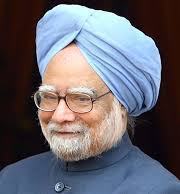
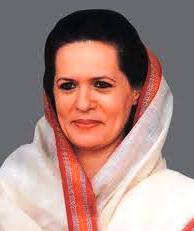 आने वाले चुनावी संघर्ष में कांग्रेस का भविष्य कोई ज्यादा अलग नहीं होगा। पिछले विधानसभाई चुनावों तक, कांग्रेस को चेतावनी देते हुए मैं हमेशा आपातकाल के बाद 1977 में हुए लोकसभाई चुनावों की याद दिलाते हुए कहता था कि एक जीवंत लोकतंत्र में प्रचण्ड क्रोध राजनीतिक व्यवस्था में सर्वाधिक अपेक्षित जवाबदेही लाने के लिए सर्वाधिक प्रभावी उपकरण बन सकता है।
आने वाले चुनावी संघर्ष में कांग्रेस का भविष्य कोई ज्यादा अलग नहीं होगा। पिछले विधानसभाई चुनावों तक, कांग्रेस को चेतावनी देते हुए मैं हमेशा आपातकाल के बाद 1977 में हुए लोकसभाई चुनावों की याद दिलाते हुए कहता था कि एक जीवंत लोकतंत्र में प्रचण्ड क्रोध राजनीतिक व्यवस्था में सर्वाधिक अपेक्षित जवाबदेही लाने के लिए सर्वाधिक प्रभावी उपकरण बन सकता है।
भारत के राजनीतिक इतिहास में सन् 1977 के संसदीय चुनाव ने कांग्रेस को सत्ताच्युत कर दिया था। तीस वर्षों तक पार्टी अजेय सी बनी रही।
परन्तु 1975 की शुरुआत में इलाहाबाद उच्च न्यायालय ने श्रीमती इंदिरा गांधी के विरुध्द एक चुनाव याचिका स्वीकार करते हुए न केवल लोकसभा के लिए उनका चुनाव रद्द कर दिया अपितु 6 वर्ष के लिए संसद का चुनाव लड़ने के लिए भी अयोग्य करार दिया। स्वाभाविक रुप से विपक्ष ने उनका त्यागपत्र मांगा। श्रीमती गांधी का जवाब था: अनुच्छेद 352 लागू कर आपातकाल थोपना।
इसके पश्चात् अनेक ऐसे कदम उठाए गए जिनसे भारत का लोकतंत्र समाप्ति के कगार पर पहुंच गया। एक लाख से ज्यादा विरोधियों जिनमें जयप्रकाश नारायण, अटल बिहारी वाजपेयी और चन्द्रशेखर जैसे देश भक्तों सहित 300 से ज्यादा मीडियाकर्मियों को आपातकाल में जेलों में डाल दिया गया। मीडिया पर अनेक प्रतिबंध थोप दिए गए।
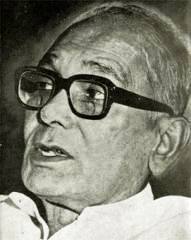 1975-77 के नाजुक संकट में भी यदि भारतीय लोकतंत्र जीवित बचा रहा तो इसके दो कारण थे। पहला, लोकतंत्र की रक्षा के लिए लोकनायक जयप्रकाश नारायण द्वारा उन राजनीतिक दलों को साथ लेकर किया गया साहसी संघर्ष, जिन्होंने आपातकाल से पूर्व ही उनके द्वारा भ्रष्टाचार के विरुध्द छेड़े गए अभियान में उनके नेतृव्त को स्वीकार कर लिया था। दूसरा, 1977 के लोकसभाई चुनावों में मतदाताओं द्वारा विरोध में की गई रिकार्डतोड़ मतदान।
1975-77 के नाजुक संकट में भी यदि भारतीय लोकतंत्र जीवित बचा रहा तो इसके दो कारण थे। पहला, लोकतंत्र की रक्षा के लिए लोकनायक जयप्रकाश नारायण द्वारा उन राजनीतिक दलों को साथ लेकर किया गया साहसी संघर्ष, जिन्होंने आपातकाल से पूर्व ही उनके द्वारा भ्रष्टाचार के विरुध्द छेड़े गए अभियान में उनके नेतृव्त को स्वीकार कर लिया था। दूसरा, 1977 के लोकसभाई चुनावों में मतदाताओं द्वारा विरोध में की गई रिकार्डतोड़ मतदान।
उस चुनाव में, उत्तर भारतीय राज्यों की 236 लोकसभाई सीटों में से कांग्रेस पार्टी केवल दो सीटें बचा सकी: एक राजस्थान और दूसरी मध्यप्रदेश में। उत्तर प्रदेश में, देश की प्रधानमंत्री स्वयं चुनावों में पराजित हो गई।
मैं मानता हूं कि हाल ही के विधानसभाई चुनाव कांग्रेस पार्टी के लिए आपातकाल के बाद से दूसरी विनाशकारी पराजय है, बावजूद इसके कि मतदाताओं को खरीदने के तमाम प्रयास किए गए। विशेष रुप से राजस्थान में, मतदाताओं को रिझाने के लिए चुनावों की पूर्व संध्या पर अनेक फैसले किए गए। भ्रष्टाचार, महंगाई, कालेधन इत्यादि सम्बन्धी अपने एक पूर्ववर्ती ब्लॉग में मैंने टिप्पणी की थी कि 2014 के लोकसभाई चुनावों में यदि कांग्रेस दो के आंकड़े तक सिमट जाए तो देश को आश्चर्य नहीं करना चाहिए।
टेलपीस (पश्च्यलेख)
अपने जीवन में मैंने अनेक यात्राएं की हैं। इस कड़ी में मेरी अंतिम यात्रा सन् 2011 में थी। इसका नाम था जनचेतना यात्रा। यह चालीस दिन तक चली।
यह यात्रा भ्रष्टाचार, महंगाई, विशेष रूप से खाद्यान्न महंगाई और कालेधन के विरूध्द थी। मांग थी कि भ्रष्टाचार रोका जाए, कीमतें कम हों, विेशेष रूप से खाद्यान्न वस्तुओं की और विदेशों के टैक्स हेवन्स में ले जाए गए धन को भारत में वापस लाया जाए।
मुझे स्वयं आश्चर्य हुआ कि मेरी इस यात्रा को जितना समर्थन मिला वह पूर्व में निकाली गई सभी यात्राओं से कहीं अधिक था।
देश में चले इस अभियान के फलस्वरूप भारत सरकार ने इस मुद्दे पर संसद में श्वेतपत्र प्रस्तुत किया, लेकिन उसके बाद कोई कदम नहीं उठाए गए। एक पैसा भी वापस नहीं लाया जा सका!
एक समाचार के मुताबिक अंतरराष्ट्रीय संस्था ‘ग्लोबल फायनेंशियल इंटीग्रटी‘ (GFI) के मुताबिक 2011 में चार लाख करोड़ रूपए का कालाधन अवैध रूप से भारत से बाहर ले जाया गया। यह गत् वर्ष की तुलना में 24 प्रतिशत अधिक था!
लालकृष्ण आडवाणी
नई दिल्ली
17 दिसम्बर, 2013

December 16, 2013
INDIAN DEMOCRACY IS VIBRANT ENOUGH TO WITHSTAND BOTH COERCION AND BRIBERY
The year 2013 is coming to a close. An important poll battle has just ended. A crucial battle is to be waged in the coming year. Before the first half of next year ends, the fate of the Sonia Gandhi-Manmohan Singh regime would have been decided. Newspaper headlines have called this last Assembly battle ‘a rout for the Congress.’ M.J. Akbar’s article in the Sunday Times (December 15, 2013) is captioned: ‘Post-poll lessons for the winners, and whiners’. The last three sentences of the article sum up the piece thus: “India seethes when every Indian is angry. We have got a glimpse in 2013. We will see the full face of anger in 2014.”

 The prospects for the Congress in the coming encounter therefore may not be very different. Till before these last Assembly elections, I used always to recall the post-Emergency Lok Sabha elections of 1977 to caution the Congress Party how, in a vibrant democracy popular fury can become the most effective instrument for ushering into the political system the much needed attribute of accountability.
The prospects for the Congress in the coming encounter therefore may not be very different. Till before these last Assembly elections, I used always to recall the post-Emergency Lok Sabha elections of 1977 to caution the Congress Party how, in a vibrant democracy popular fury can become the most effective instrument for ushering into the political system the much needed attribute of accountability.
1977 was the first parliamentary election in India’s political history in which the Congress Party was dislodged from office. For thirty years, the party had seemed invincible.
But in early 1975 the Allahabad High Court accepted an election petition against Smt. Indira Gandhi and not only annulled her election to the Lok Sabha but besides, disqualified her from being elected to Parliament for a period of six years. The opposition naturally demanded her resignation. Mrs. Gandhi’s response was: invocation of Art. 352 and imposition of the Emergency.
A series of steps followed which brought India’s democracy to the brink of annihilation. Over one lakh opponents of the Emergency including patriots like Jayaprakash Narayan, A.B. Vajpayee and Chandrashekher, besides more than 300 media persons were put behind bars. Numerous curbs were imposed on the media.
 If Indian Democracy has survived this critical crisis of 1975-1977, the credit goes to two factors. Firstly, the valiant struggle for the defence of democracy put up by Lok Nayak Jayaprakash Narayan along with the political parties who had accepted his leadership when he, even before the Emergency, had mobilized a campaign against corruption. Secondly, the electorate’s angry record-breaking verdict in the 1977 Lok Sabha elections.
If Indian Democracy has survived this critical crisis of 1975-1977, the credit goes to two factors. Firstly, the valiant struggle for the defence of democracy put up by Lok Nayak Jayaprakash Narayan along with the political parties who had accepted his leadership when he, even before the Emergency, had mobilized a campaign against corruption. Secondly, the electorate’s angry record-breaking verdict in the 1977 Lok Sabha elections.
In that election, out of the 236 Lok Sabha seats in the northern states, the Congress Party secured only two seats, one in Rajasthan and the second in M.P. In U.P., the Prime Minister of the country, Smt. Indira Gandhi herself was defeated in the elections.
I hold that the recent round of Assembly elections has been for the Congress Party the second disastrous defeat since the Emergency days, despite all attempts to buy over the voters. In Rajasthan particularly, numerous election-eve decisions were taken to tempt the voters. In one of my earlier blogs relating to corruption, inflation, black money etc. I had remarked that in the 2014 Lok Sabha polls, the country need not be surprised if the Congress score slumps to two digits.
TAILPIECE
I have undertaken numerous yatras in my life. My last yatra was in 2011. It was named Jana Chetna Yatra. The duration was 40 days.
The yatra was a campaign against corruption, inflation, particularly food inflation, and black money. The demand was to stop corruption, bring down prices, particularly of food articles, and take steps to bring back to the country money stashed in tax havens overseas.
I was myself surprised to discover that the popular response to this last yatra was far greater than to all my earlier yatras.
Following this campaign in the country, GOI presented a White Paper on the issue in Parliament, but there has been no follow-up. Not a single paisa has been brought back.
A recent news report put out by the international watchdog Global Financial Integrity (GFI) has revealed that in 2011 over Rs. four lakh crores of black money was illegally taken out of India. This was 24 percent more than the previous year!
L.K. Advani
New Delhi
December 17, 2013

November 30, 2013
भारत को पोलियो मुक्त बनाने में डॉ0 हर्षवर्धन की पथप्रदर्शक भूमिका
मेरी पत्नी कमला और मेरे लिए यह महीना विशेष महत्व का है, क्योंकि हम दोनों का जन्मदिन नवम्बर में ही पड़ता है। कमला का 27 नवम्बर और मेरा 8 नवम्बर को। मेरी सुपुत्री प्रतिभा ने मुझे सुझाया कि परिवार को दोनों का जन्मदिन 24 नवम्बर (रविवार) को मित्रो को संगीत के कार्यक्रम के साथ-साथ दोपहर के भोजन पर बुलाकर मनाना चाहिये। इस कार्यक्रम में भाग लेने वाले अधिकांश मित्रो ने निजी रूप से मुझे बताया कि समूचे कार्यक्रम हेतु प्रतिभा की योजना सर्वोत्तम थी चाहे वह सजावट हो, या भोजन इत्यादि।
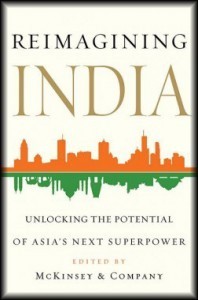 इस अवसर पर मित्रो द्वारा मुझे भेंट की गई पुस्तकों में से एक से मैं अत्यधिक प्रभावित हुआ जो भारत के बारे में थी और जिसका प्रकाशन तथा सम्पादन प्रसिध्द वैश्विक मैनेजमेंट संस्था मेंकेन्जी एण्ड कम्पनी ने किया है। पुस्तक का शीर्षक है: रिइमेजिंग इण्डिया: अनलॉकिंग दि पोटोन्शियल ऑफ एशियाज नेक्सट सुपरपॉवर (Reimagining: Unlocking the potential of Asia’s next Super power).
इस अवसर पर मित्रो द्वारा मुझे भेंट की गई पुस्तकों में से एक से मैं अत्यधिक प्रभावित हुआ जो भारत के बारे में थी और जिसका प्रकाशन तथा सम्पादन प्रसिध्द वैश्विक मैनेजमेंट संस्था मेंकेन्जी एण्ड कम्पनी ने किया है। पुस्तक का शीर्षक है: रिइमेजिंग इण्डिया: अनलॉकिंग दि पोटोन्शियल ऑफ एशियाज नेक्सट सुपरपॉवर (Reimagining: Unlocking the potential of Asia’s next Super power).
आवरण का पहला फ्लैप पुस्तक का परिचय ऐसी पुस्तक के रूप में कराता है ”जो पृथ्वी पर एक सर्वाधिक महत्वपूर्ण और सबसे कम समझे जाने वाले राष्ट्र द्वारा सामना की जा रही चुनौतियों तथा तलाश जाने वाले अवसरों पर दुनियाभर के अग्रणीय चिंतकों ंको एक साथ लाती है।”
पुस्तक के परिचय के अनुसार ”विभिन्न क्षेत्रों में अपना योगदान देने वालों जिनमें सीएनएन के फरीद जकरिया, भारत के निजी क्षेत्र के सर्वाधिक विशाल संगठन के सीईओ मुकेश अम्बानी, माइक्रोसॉफ्ट के संस्थापक बिल गेट्स, गूगल के चेयरमैन इरिक समिडिट, पुरस्कार विजेता सुकेतु मेहता, एडवर्ड लुसे और पैट्रिक फ्रेंच, इन्फोसिस के सहसंस्थापक और यूनिक आइडेंटिफिकेशन अथॉरिटी ऑफ इण्डिया के चेयरमैन नन्दन नीलेकनी और अन्य अनेक विशेषज्ञ शामिल हैं।
विशेषज्ञों के इस संक्षिप्त परिचय के बाद, मैंने तुरन्त देखा कि बिल गेट्स ने भारत के संदर्भ में क्या कहा है। यह देखकर मुझे सुखद आश्चर्य हुआ कि उनके द्वारा लिखे गए लेख का शीर्षक था ”व्हाट आई लर्नड इन दि वॉर (ऑन पोलियो) (What I learned in the war (on polio)A
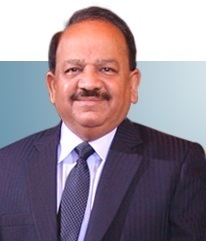 गत् रात्रि को ही मुझे दिल्ली विधानसभाई चुनावों के लिए भाजपा के मुख्यमंत्री पद के उम्मीदवार डा0 हर्षवर्धन द्वारा लगभग एक दशक पूर्व लिखी गई पुस्तक प्राप्त हुई।
गत् रात्रि को ही मुझे दिल्ली विधानसभाई चुनावों के लिए भाजपा के मुख्यमंत्री पद के उम्मीदवार डा0 हर्षवर्धन द्वारा लगभग एक दशक पूर्व लिखी गई पुस्तक प्राप्त हुई।
इस पुस्तक के पहले पृष्ठ पर डॉ0 हर्षवर्धन ने शालीनता से यह उल्लिखित किया हुआ था ”धन्यवाद आदरणीय आडवाणीजी, 1994 में जो कर पाया वह आपके कारण ही संभव हुआ। आज, पिछले तीन वर्षों से हम पोलियो मुक्त देश हैं।
हर्ष,
27.11.2013”
बिल गेट्स का लेख जो आज मेरे ब्लॉग का मुख्य विषय है, कहता है कि ”पोलियो उन्मूलन में भारत की उपलब्धि ऐसी सर्वाधिक प्रभावी स्वास्थ्य क्षेत्र सम्बन्धी सफलता है, जैसी मैंने कभी नहीं देखी।”
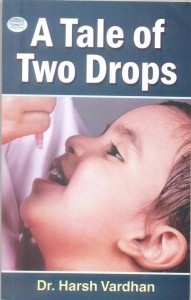 जब सन् 2004 में डॉ0 हर्षवर्धन ने ‘ए टेल ऑफ टू ड्राप्स‘ (A Tale of Two Drops) लिखी तो इसकी प्रस्तावना लिखने का अनुरोध मुझसे किया। तीन पृष्ठों की इस प्रस्तावना के पहले दो पैराग्राफ ही बताते हैं कि क्यों मैंने उन्हें भाजपा का मुख्यमंत्री पद का प्रत्याशी बनाने का सुझाव आग्रह से दिया। अपनी प्रस्तावना में मैंने कहा:
जब सन् 2004 में डॉ0 हर्षवर्धन ने ‘ए टेल ऑफ टू ड्राप्स‘ (A Tale of Two Drops) लिखी तो इसकी प्रस्तावना लिखने का अनुरोध मुझसे किया। तीन पृष्ठों की इस प्रस्तावना के पहले दो पैराग्राफ ही बताते हैं कि क्यों मैंने उन्हें भाजपा का मुख्यमंत्री पद का प्रत्याशी बनाने का सुझाव आग्रह से दिया। अपनी प्रस्तावना में मैंने कहा:
दस वर्ष पहले, सन् 1994 में मैं इस पुस्तक के लेखक और एक मायने में पोलियोमुक्त भारत के लिए चलाए गए अभियान के प्रमुख प्रवर्तक डा. हर्ष वर्धन के घनिष्ठ संपर्क में आया। वह उसी समय दिल्ली के स्वास्थ्य मंत्री बने थे, साथ ही दिल्ली मेडिकल एसोसिएशन के अध्यक्ष भी चुने गए थे।
डा0 हर्ष वर्धन के साथ हुई मेरी प्रारंभिक बातचीत में ही उन्होंने मुझे पोलियो उन्मूलन के लिए विश्व स्वास्थ्य संगठन के वैश्विक स्तर पर किए जा रहे प्रयासों की जानकारी दी। साथ ही यह भी बताया कि ये प्रयास ब्राजील और फिलीपींस जैसे देशों में किस तरह सफल हुए हैं। उन्होंने बताया कि वह विश्व स्वास्थ्य संगठन के पल्स पोलियो अभियान से संबंध्द साहित्य का विस्तृत अध्ययन कर चुके हैं और आश्वस्त हैं कि देश की राजधानी दिल्ली, जो पोलियो से सर्वाधिक प्रभावित क्षेत्र है, इस संकट से मुक्त हो सकती है।
मैं इस संबंध में डा0 हर्ष वर्धन की उल्लेखनीय उपलब्धियों के लिए उन्हें ह्दय से बधाई देना चाहता हूँ। उन्होंने दिल्ली से अभियान की शुरुआत की और शीघ्र ही यह देशव्यापी अभियान में परिवर्तित हो गया। वस्तुत: पल्स पोलियो अभियान एक ऐसे सबसे बड़े अभियान के रुप में उभरकर साने आया, जिसमें सरकारी और निजी क्षेत्रों की आदर्श भागीदारी देखने को मिली, जो भारत में एक स्वस्थ समाज बनाने में सहायक सिध्द हुई। मुझे प्रसन्ना है कि उन्होंने अपने अनुभवों को इस पुस्तक के माध्यम से प्रस्तुत किया है।
अपने लेख में बिल गेट्स लिखते हैं कि बंगलौर पर से उड़ान भरते समय जब हम ”अपने गंतव्य की ओर पहुंच रहे थे, तब मैंने खिड़की से बाहर झांक कर देखा एक बेतरतीव भीड़भरा क्षेत्र, जीर्ण-शीर्ण घर जो मीलों तक फैले हुए थे।” साथ में यात्रा कर रहे एक भारतीय ने गर्व से कहा ”बंगलौर में कोई स्लम नहीं है।”
 बिल गेट्स ने कुशाग्रतापूर्ण से टिप्पणी की कि ”चाहे इंकार, शर्मिंदगी या निर्दोषता के चलते मेरे सहयोगी दूसरे भारत को नहीं देखते। मेरा अर्थ उन्हें अकेले इंगित करना नहीं है। गरीबों से हमारी नजरें मोड़ना आसान है। परन्तु यदि हम ऐसा करते हैं, तो हम एक समाज की पूर्ण संभव्यता को देखना भूलेंगे।
बिल गेट्स ने कुशाग्रतापूर्ण से टिप्पणी की कि ”चाहे इंकार, शर्मिंदगी या निर्दोषता के चलते मेरे सहयोगी दूसरे भारत को नहीं देखते। मेरा अर्थ उन्हें अकेले इंगित करना नहीं है। गरीबों से हमारी नजरें मोड़ना आसान है। परन्तु यदि हम ऐसा करते हैं, तो हम एक समाज की पूर्ण संभव्यता को देखना भूलेंगे।
लेखक आगे कहता है:
मैं जानता हूं कि उस समय भारत के सर्वाधिक विशेषाधिकार सम्पन्न लोगों - महान बुध्दिमता वाले परिश्रमी और कल्पनाशीलता वाले शिक्षित नागरिकों के साथ सहयोग करने का सौभाग्य मिला। लेकिन जब मेलिण्डा और मैंने भारत में फाउण्डेशन का काम शुरू किया तब हमने उन लोगों से मिलना शुरू किया जो उन क्षेत्रों से थे , जिलके ऊपर से हमने उड़ान भरी थी। वे कम शिक्षित और दयनीय अवस्था में थे, और स्लम व गरीब ग्रामीण क्षेत्रों में रहते थे - इनके बारे में अनेक विशेषज्ञों ने हमें बताया कि इनके चलते भारत पीछे है। फिर भी भारत में हमारा अनुभव इसका उल्टा है: कि जिसे कुछ लोग कमजोरी कहते हैं वह इसके बजाय महान शक्ति का स्त्रोत बन सकता है।
इसके अलावा बिल गेटस ने हमारे देश के बारे में और प्रशंसा करते हुए कहा कि: भारत द्वारा अपने पोलियो विरोधी अभियान के लिए पूरी राशि उपलब्ध कराना प्रतिबध्दता और आत्मविश्वास का गुंजायमान वक्तव्य है।
इस अभियान के मूल्यांकन को सारांश रूप के साथ बिल गेट्स ने अपने लेख की समाप्ति इस तरह की है:
”अभियान ने भारत के सर्वोत्तम को प्रदर्शित किया - चाहे वह अनवरत भावना हो, वैज्ञानिक
शक्ति, व्यवसायिक निपुणता, उत्पादक कुशलता, राजनीतिक कल्पनाशीलता और विशाल मानव संसाधन जो दो मिलियन लोगों को तैनात कर सकता है और एक बिलियन की कल्पनाशीलता को जोश से भर सकता है। हां, भारत ने अनेक क्षेत्रों में चुनौतियों का सामना किया है जो मीडिया में सुव्यवस्थित ढंग से दर्ज हैं। लेकिन पोलिया के विरूध्द लड़ाई में भारत ने दुनिया को दिखा दिया है कि जब इसके लोग एक महत्वाकांक्षी लक्ष्य निर्धारित कर लेते हैं, देश एकजुट हो जाता है और इसका व्यापक असर होता है तो भारत की नियति अंतहीन है।”
मुझे यह जानकर प्रसन्नता और गर्व होता है कि भारत को पोलियो मुक्त बनाने में भाजपा, और डा0 हर्षवर्धन ने व्यक्तिगत रूप से महत्वपूर्ण एवं निर्णायक भूमिका निभाई है।
अत: इसमें कोई आश्चर्य नहीं कि डॉ0 हर्षवर्धन को इस क्षेत्र में उनके उल्लेखनीय योगदान के लिए अंतरराष्ट्रीय और राष्ट्रीय स्तर पर अनेक पुरस्कार प्राप्त हुए हैं। वह विश्व स्वास्थ्य संगठन (WHO) के महानिदेशक से अंतरराष्ट्रीय पुरस्कार, रोटरी फाउण्डेशन द्वारा पोलियो इरेडिकेशन चैम्पियन अवार्ड, लॉयन्स क्लब द्वारा इंटरनेशनल सर्विस अवार्ड, रोटरी इंटरनेशनल द्वारा पॉल हेरिस फैलोशिप, इण्डियन मेडिकल एसोसिएशन द्वारा एपरिसियेशन अवार्ड (दो बार) पा चुके हैं।
सन् 2001 में रोटरी द्वारा डा0 हर्षवर्धन को सम्मानित करने के कार्यक्रम में श्री अटल बिहारी वाजपेयी ने उन्हें डा0 स्वास्थ्य वर्धन के रूप में वर्णित किया। एक और प्रधानमंत्री श्री इन्द्र कुमार गुजराल ने भी डा. हर्ष वर्धन को उनकी उपलब्धि पर गर्मजोशी से बधाई दी थी। उन्होंने कहा कि ऐसा बेहतरीन स्वास्थ्य मंत्री उनके देखने में कोई और नहीं आया।
लालकृष्ण आडवाणी
नई दिल्ली
29 नवम्बर, 2013

November 28, 2013
DR. HARSH VARDHAN’S PIONEERING ROLE IN MAKING INDIA POLIO-FREE
For my wife Kamla as well as for me, this month has a special significance; the birthdays of both of us fall in November. Kamla’s is on 27th, and mine is on 8th. This year, my daughter Pratibha suggested that the family celebrate the two birthdays on Sunday November 24th and invite friends for a Musical programme, followed by lunch. Most of those who attended personally told me that Pratibha’s planning of the entire programme, the décor, food etc was really superb.
 Going through the books some friends presented to me this day, I have been greatly impressed by a book about India, published and edited by a renowned global management concern, McKinsey & Company. The title of this book is: Reimagining India: Unlocking the potential of Asia’s next Super power.
Going through the books some friends presented to me this day, I have been greatly impressed by a book about India, published and edited by a renowned global management concern, McKinsey & Company. The title of this book is: Reimagining India: Unlocking the potential of Asia’s next Super power.
The front flap of the cover introduces the book as one that “brings together leading thinkers from around the world to explore the challenges and opportunities faced by one of the most important and least understood nations on earth”.
This book, the introduction continues, “features an all star cast of contributors including CNN’s Fareed Zakaria, Mukesh Ambani, CEO of India’s largest private conglomerate; Microsoft founder Bill Gates; Google Chairman Eric Schmidt; award winning authors: Suketu Mehta, Edward Luce, and Patrick French; Nandan Nilekani, Infosys Cofounder, and chairman of the Unique Identification Authority of India” and a host of other experts in variegated fields.
Of the contributors mentioned in this brief introduction, I immediately glanced at the contents to see what had Bill Gates written in the context of India. I was pleasantly surprised to see that the article listed against his name was “What I learned in the war (on polio)”.
 Only last night I have received from Dr. Harsh Vardhan, BJP’s Chief Ministerial nominee for the Delhi Assembly elections a book written by him about a decade back.
Only last night I have received from Dr. Harsh Vardhan, BJP’s Chief Ministerial nominee for the Delhi Assembly elections a book written by him about a decade back.
On the opening page of this book, Dr. Harsh Vardhan has graciously inscribed “Thanks Respected Advaniji, you made it possible for me in 1994. Today, we are a polio-free nation for last three years.”
Harsh
27.11.2013
The article by Bill Gates which is the core theme of my blog today says that “India’s accomplishment in eradicating polio is the most impressive global health success I’ve ever seen.”
 When in 2004, Dr. Vardhan wrote this book titled A Tale of Two Drops he had asked me to write a Foreword for the book. The first two paragraphs of the three-page foreword I wrote for him would highlight why I strongly commended to the party that he be named the BJP’s Chief Ministerial candidate. In my Foreword, I said :
When in 2004, Dr. Vardhan wrote this book titled A Tale of Two Drops he had asked me to write a Foreword for the book. The first two paragraphs of the three-page foreword I wrote for him would highlight why I strongly commended to the party that he be named the BJP’s Chief Ministerial candidate. In my Foreword, I said :
Ten years back, in 1994, I came in close contact with Dr. Harsh Vardhan, the author of this book and, in a way, a principal pioneer of the national campaign for a polio-free India. He had just been appointed Health Minister of the Union Territory of Delhi, and simultaneously elected president of the Delhi Medical Association. In my very early meetings with Dr. Harsh Vardhan, he enlightened me about the World Health Organisation’s efforts to eradicate polio globally and how they had succeeded in countries like Brazil and Philippines. He told me that he had studied the entire WHO literature about the ‘Pulse Polio Campaign’, and that he was confident that the country’s capital, which was among the worst afflicted areas in India, could be rid of this scourge.
“I would like to compliment Dr. Harsh Vardhan heartily for his remarkable achievement. He started the campaign in Delhi and soon it emerged as a nationwide mission. Indeed, the pulse polio drive became the largest mass campaign, with exemplary public-private partnership, for the cause of making India a healthy society. I am happy that he has penned his experiences in the form of this book.”
In his article, Bill Gates says that while flying into Bangalore, as we “made our final approach, I looked out of the window and saw an area of densely packed, tiny, dilapidated homes stretching out for miles”. An Indian accompanying him proudly said “We have no slums in Bangalore”.
 Bill Gates perceptively comments: “Whether out of denial, embarrassment, or innocence, my colleague didn’t see the other India. I don’t mean to single him out. It can be easy to turn our eyes away from the poor. But if we do, we miss seeing a society’s full potential.
Bill Gates perceptively comments: “Whether out of denial, embarrassment, or innocence, my colleague didn’t see the other India. I don’t mean to single him out. It can be easy to turn our eyes away from the poor. But if we do, we miss seeing a society’s full potential.
The article adds very rightly :
“I knew at the time that I was very fortunate to be collaborating with the most privileged people of India – highly educated citizens of great intelligence, diligence, and imagination. But when Melinda and I started our foundation’s work in India, we began to meet people from the areas we’d been flying over. They had little education and poor health, and lived in slums or poor rural areas – the kind of people many experts had told us were holding India back. Yet our experience in India suggests the opposite: that what some call a weakness can instead be a source of great strength.”
Yet another compliment paid by Bill Gates to our country is his observation: That India fully funded its own anti-polio plan is a ringing statement of commitment and self-confidence.
Summing up his evaluation of the campaign, Bill Gates concludes his article thus;
“The campaign showed India at its best―the relentless spirit, the scientific power, the business acumen, the manufacturing skill, the political imagination, and the vast human resources that can deploy more than two million people and spark the imagination of a billion. Yes, India faces challenges in many areas that are well documented in the media. But in its fight against polio, India has shown the world that when its people set an ambitious goal, mobilize the country, and measure the impact, India’s promise is endless.”
I feel happy and proud to find that in making India polio free, the BJP, and Dr. Vardhan personally, have played a vital and distinctive role.
Little wonder that Dr. Harsh Vardhan has been awarded numerous International and national Awards for his remarkable contribution in this field. He has been recipient of International Award by the Director General of World Health Organisation, Polio Eradication Champion Award by Rotary Foundation, International Service Award by Lions Club, Paul Harris Fellowship of Rotary International, Indian Medical Association Special Appreciation Award (Twice).
At a Rotary function held in 2001 to felicitate Dr. Harsh Vardhan, Shri A.B. Vajpayee described him as DR. SWASTHYA VARDHAN! Yet another Prime Minister who warmly complimented Dr. Harsh Vardhan for his performance was Shri I.K. Gujral. He described him as the best Health Minister Delhi has had.
L.K. Advani
New Delhi
29 Nov, 2013

November 24, 2013
बेहतरीन फोटोग्राफ्स: शिप्रा दास की अद्वितीय पुस्तक
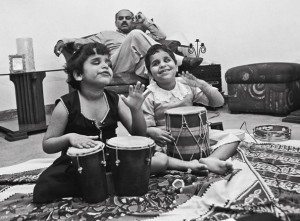 अतीत में, मैं अनेक पुस्तक लोकार्पण कार्यक्रमों में जाता रहा हूं। परन्तु इस सप्ताह के सोमवार (18 नवम्बर, 2013) को जिस कार्यक्रम में गया वह वास्तव में कभी न भूलने वाला था। कार्यक्रम राष्ट्रपति भवन में, राष्ट्रपति महोदय की उपस्थिति में हुआ मगर पुस्तक का विमोचन उन्होंने नहीं किया! पुस्तक ‘दि लाइट विदइन‘ का औपचारिक लोकार्पण प्रज्ञा और प्राची नाम की दो छोटी बच्चियों द्वारा किया गया। दोनों जुड़वा बहनें हैं और वे जन्मांध हैं। वर्तमान में यह दोनों बारहवीं कक्षा में पढ़ती हैं। शिप्रा की पुस्तक में इन दोनों की अपने पिता के साथ पूर्व में खीची गई फोटो है।
अतीत में, मैं अनेक पुस्तक लोकार्पण कार्यक्रमों में जाता रहा हूं। परन्तु इस सप्ताह के सोमवार (18 नवम्बर, 2013) को जिस कार्यक्रम में गया वह वास्तव में कभी न भूलने वाला था। कार्यक्रम राष्ट्रपति भवन में, राष्ट्रपति महोदय की उपस्थिति में हुआ मगर पुस्तक का विमोचन उन्होंने नहीं किया! पुस्तक ‘दि लाइट विदइन‘ का औपचारिक लोकार्पण प्रज्ञा और प्राची नाम की दो छोटी बच्चियों द्वारा किया गया। दोनों जुड़वा बहनें हैं और वे जन्मांध हैं। वर्तमान में यह दोनों बारहवीं कक्षा में पढ़ती हैं। शिप्रा की पुस्तक में इन दोनों की अपने पिता के साथ पूर्व में खीची गई फोटो है।
प्राची और प्रज्ञा , जब वे मात्र 6 वर्षों की थी,
दिल्ली के व्यवसायी अपने पिता के साथ
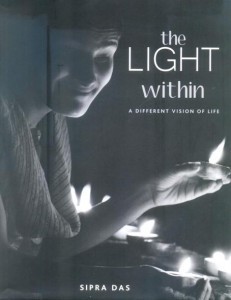 शीर्षक में जिस पुस्तक को मैंने ‘अद्वितीय‘ वर्णित किया है वह फोटोपत्रकार शिप्रा दास द्वारा खींचे गए फोटोग्राफ्स का संकलन है।
शीर्षक में जिस पुस्तक को मैंने ‘अद्वितीय‘ वर्णित किया है वह फोटोपत्रकार शिप्रा दास द्वारा खींचे गए फोटोग्राफ्स का संकलन है।
दशकों से मैं दिल्ली में रहकर राजनीति में सक्रिय हूं और इसीलिए वर्षों से मैं शिप्रादास को जानता हूं। गुलजार जो स्वयं में एक महान कलाकार हैं, से ज्यादा कोई और बेहतर ढंग से उसका वर्णन नहीं कर सकते। एकदम शुरूआती पैराग्राफ ही पाठकों को फोटोग्राफर और उसके फोटोग्राफ्स का उत्तम रीति से वर्णन करता है, जिसके चलते यह पुस्तक अद्वितीय बनी है। गुलजार लिखते हैं:
शिप्रा दास के कैमरे में लैंस की जगह दिल है। जो अपनी अंगुलियों से चेहरों को देख और अनुभव कर सकता है , उनके पास अपने दिल से देखने हेतु आंतरिक लैंस है।
शिप्रा वही है।
दृष्टि विकलांग श्री जवाहर कौल ”ऑल इण्डिया कन्फेडेरेशन ऑफ दि ब्लाइंड” के प्रधानाचार्य हैं, वे कहते हैं: ”आप अपनी आंखों से देख सकते हो, लेकिन अपने दिल से नहीं, जैसे हम देख सकते हैं।” लेकिन शिप्रा दोनों से देख सकती है।
शिप्रा दास के फोटोग्राफ्स को देखने के बाद मछुआरे मिसरी साहनी , साफत अली हसन, मोटर मैकेनिक रियाजुद्दीन, की जिंदगी इतनी सामान्य दिखती है कि मुझे अपनी क्षमताएं कम, पिछड़ी और विकलांग सी लगती हैं।
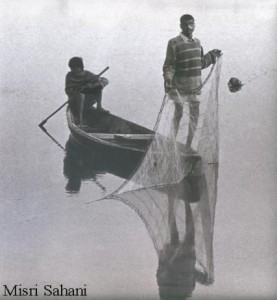 पुस्तक का प्रकाशन नियोगी बुक्स ने किया है। कार्यक्रम का निमंत्रण जिसमें स्थान, दिनांक और भाग लेने वाले महानुभावों का संकेत मिलता है, न केवल परम्परागत रूप से छपा हुआ है अपितु ब्रेल लिपि में भी है।
पुस्तक का प्रकाशन नियोगी बुक्स ने किया है। कार्यक्रम का निमंत्रण जिसमें स्थान, दिनांक और भाग लेने वाले महानुभावों का संकेत मिलता है, न केवल परम्परागत रूप से छपा हुआ है अपितु ब्रेल लिपि में भी है।
सन् 2005 में शिप्रा ने मुझे अपने फोटोग्राफ्स की प्रदर्शनी का उद्धाटन करने हेतु निमंत्रण दिया था। उसकी थीम भी यही थी जिसे उसने विकसित कर अब 204 पृष्ठों की पुस्तक के रूप में प्रकाशित किया है। मुझे पता चला कि उसने अपनी पूर्व प्रदर्शनी देश के आठ विभिन्न शहरों में लगाई थी।
इस पुस्तक के प्रकाशक ने समुचित रूप से इसकी सामग्री को यूं सारांश रूप में प्रस्तुत किया है:
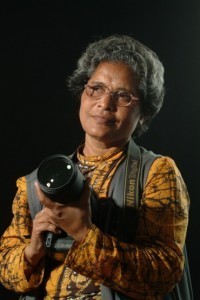 ”दि लाईट विदइन” मन्द दृष्टि लोगों के असाधारण जीवन को चित्रों के माध्यम से सही अर्थों में समानुभूति को प्रोत्साहित करती है और कुछ हद तक विस्मय के साथ। वे अपनी वाकपटुता, कुशाग्रता, स्पष्टता से आगे देखने की क्षमता से आपको मंत्रमुग्ध करते हैं। ‘दि लाईट विदइन‘ में शिप्रा संघर्ष और जीवित रहने, निराशा और आशा, पलटाव और विजयों की कहानी बयां करती है।
”दि लाईट विदइन” मन्द दृष्टि लोगों के असाधारण जीवन को चित्रों के माध्यम से सही अर्थों में समानुभूति को प्रोत्साहित करती है और कुछ हद तक विस्मय के साथ। वे अपनी वाकपटुता, कुशाग्रता, स्पष्टता से आगे देखने की क्षमता से आपको मंत्रमुग्ध करते हैं। ‘दि लाईट विदइन‘ में शिप्रा संघर्ष और जीवित रहने, निराशा और आशा, पलटाव और विजयों की कहानी बयां करती है।
इस पुस्तक में प्रत्येक कहानी नाटक से भरपूर है। पुस्तक के चरित्र हमारी आंखें खोलते हैं। वे हमें जीवन को एक नए प्रकाश में देखना सिखाते हैं। वे हमें एक मनुष्य बनने में सहायता देते हैं। वे हमें सत्य की अंधकारमयी चकाचौंध से रूबरू कराते हैं जो हमारे ज्ञान से बाहर रह गया हो और उन अद्भुत जिन्दगियों को इस पुस्तक के माध्यम से स्पर्श नहीं किया गया। वे हमें प्रेरित करते हैं।
उसने (शिप्रा) अपने कैरियर की शुरूआत अस्सी के दशक के शुरू में कोलकाता में आनन्द बाजार पत्रिका समूह और फिर आजकल समाचारपत्र से की। सन् 1987 में वह पीटीआइ से जुड़ीं। उन्होंने नई दिल्ली में एजेंसी के राष्ट्रीय फोटो कवरेज से पहले कोलकाता में पीटीआई फोटो सेवा का विस्तार किया।
बाद में, दो दशकों से अधिक इण्डिया टूडे पत्रिका में काम करते हुए उन्होंने प्रमुख राजनीतिक समाचारों, देश के वरिष्ठ राजनीतिज्ञों और राजनीतिक तथा ऐतिहासिक महत्वपूर्ण घटनाओं को कॅवर किया।

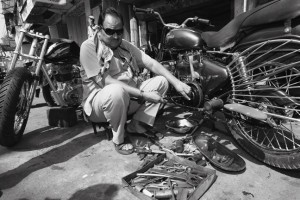
रेशमी सोनवणे रियाजुद्दीन

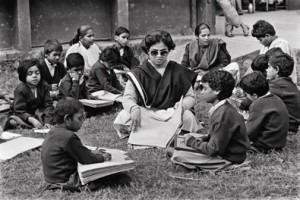
प्रीति मोंगा संगीता
पृष्ठ 2-3 पर इस ब्लॉग के पाठकों के लिए सिप्रा दास द्वारा चुनी गई दृष्टिहीनों के आसाधारण जीवन के उदाहरण दिए गए हैं।
संगीता , 38
स्कूल अध्यापिका
बिहार के मुजफ्फरपुर के एक लोहा विक्रेता की सुपुत्री संगीता दृष्टिहीनों के लिए एक आवासीय स्कूल चलाने के साथ-साथ गांव के गरीब बच्चों की सहायता के उद्देश्य से शुभम नाम का एक गैर-सरकारी संगठन चलाती है। दृष्टिहीन होने के नाते साधारण स्कूल में पढ़ाई करने के उनके सभी प्रयास विफल रहे। परन्तु उनका पढ़ाई का रिकार्ड किसी चमत्कार से कम नहीं है। उन्होंने विकलांगों के स्कूल में पढ़ाई की और मेरिट सूची में दसवां स्थान प्राप्त किया। उसने एम.फिल और पी.एच.डी. उपाधि हासिल की। सन् 1986 में वह विश्वविद्यालय के उन तीन सौ टॉप करने वालों में थीं जिन्हें तत्कालीन प्रधानमंत्री राजीव गांधी ने चायपान पर बुलाया था। उन निमंत्रितों में से वह ही एकमात्र दृष्टिहीन थीं। प्रधानमंत्री ने उनसे पूछा कि वह आगे क्या करना चाहती हैं। उनका तत्काल जवाब था वह दृष्टिहीनों को सामान्य जीवन जीने में सहायता करना चाहती हैं जैसीकि वह जी रही हैं। शेष इतिहास है। तब से संगीता अपने मिशन में शक्ति पाती जा रही है।
मिसरी साहनी , 30
मछुआरा
मिसरी साहनी बिहार के बुध्दनगर गांव के एक दृष्टिहीन मछुवारे हैं वह अपने घर कभी खाली हाथ नहीं लौटते। सात भाई-बहनों में सबसे बड़े मिसरी साहनी ने दो वर्ष की आयु में ही अपनी दृष्टि खो दी। दो महीने उनका ईलाज चला लेकिन डॉक्टर की मृत्यु हो गई। उसके पश्चात उनका कोई इलाज नहीं हुआ- उनके परिवार और पड़ोसियों को लगता था कि वह काले जादू का शिकार है। उनका भाग्य तब जागा जब उन्होंने अपने मछुआरे पिता के साथ बड़ीगंडक नदी जाना शुरू किया। मिसरी अच्छे तैराक हैं और किसी सक्षम मछुआरे से ज्यादा हैं। ठीक मौसम में वह 5000/-रूपए महीने तक कमा लेते हैं। वह कहते हैं कि सितम्बर और अक्तूबर के महीनों में मछली पकड़ना ज्यादा होता है।
मिसरी एक जनरल प्रोविज़न स्टोर चलाते हैं जो उन्होंने एक छोटे से सरकारी कर्जे की सहायता से शुरू किया। जब वह मछली पकड़ने जाते हैं तब उनके माता-पिता दुकान चलाते हैं। अक्सर वह पूरी रात नाव पर ही बिता देते हैं।
रेशमी सोनवणे , 32
ब्यूटीशियन
रेशमी सोनवणे कोई सामान्य ब्यूटीशियन नहीं है। न ही वह एक दृष्टिहीन महिला की छवि में समाती हैं। एक बच्चे की मां रेशमी आनुवंशिक रूप से दृष्टिहीन हैं। लेकिन इस बाधा ने उन्हें मुंबई के अपने अच्छे घर से ब्यूटीपार्लर चलाने से नहीं रोका। वह अनेक प्रकार की सेवाएं - बेसिक ब्यूटी ट्रीटमेंट से हेयर ड्रेसिंग और अरोमथरेपी देती हैं। रेशमी की हालत उस समय ध्यान में आई जब वह पेड्डार रोड के हिलग्रीन स्कूल की पांच वर्षीय छात्रा थी। वह कहती हैं कि ”मुझे मेरे अंधेपन का कारण नहीं पता था”। उनके अनुसार ”12वीं कक्षा की परीक्षा में वर्णमाला के अक्षर धुंधले दिखने लगे थे। एक काऊंसलर ने इस समस्या से निजात पाने में सहायता की और उसने अपनी शिक्षा पूरी की। रेशमी इतिहास में आनर्स स्नातक है, जो उन्होंने पाठकों और लेखकों की सहायता से पूरी की। तत्पश्चात् उसने आयात-निर्यात प्रबन्धन का अतिरिक्त प्रशिक्षण लिया। उनकी सुंदर आंखों के चलते रेशमी को अक्सर बस कंडक्टरों के असभ्य व्यवहार का सामना करना पड़ता है क्योंकि वे मानने को तैयार नहीं होते कि वह वास्तव में दृष्टिहीन हैं। वह कहती हैं ”यह मुझे काफी अपमानजनक लगता है”। उनके पति टाटा मोटर डीलर हैं। उन्होंने अपने परिवार की इच्छा के विरूध्द यह विवाह किया। इस पर उनके परिवारवालों ने सम्बन्ध तोड़ लिया। आज, रेशमी को इस पर कोई पछतावा नहीं है।
रियाजुद्दीन , 55
मोटरसाइकिल मैकेनिक
रियाजुद्दीन भोपाल (मध्य प्रदेश) में एक मोटरसाइकिल मैकेनिक हैं। उनके द्वारा अपनाए गए पसंदीदा पेशे में उनकी दक्षता है। पूरे देशभर से इंजीनियर और मैकेनिक जरूरत पड़ने पर उनकी सलाह लेते हैं। दस बच्चों में से एक रियाजुद्दीन को मुन्नाभाई के नाम से भी पहचाना जाता है; 23 वर्ष की आयु में उनकी आंखों की रोशनी चली गई।
सत्तर के दशक की शुरूआत में जब एक मच्छर ने उनकी आंख पर काट लिया तो उन्हें एक डॉक्टर के पास ले जाया गया। डॉक्टर ने उनको जो दवा दी उसकी अवधि समाप्त हो चुकी थी। उनकी एक आंख की रोशनी चली गई। छ: महीने बाद दवाब के चलते उनकी दूसरी आंख की भी रोशनी जाती रही। गरीब होने के कारण उनका परिवार और ज्यादा इलाज नहीं करा सका। सन् 1980 में वह दिल्ली में टायर खरीदने गए। उनके अंधेपन का लाभ उठाने की उम्मीद से दुकानदार ने उन्हें पुराना टायर दे दिया। रियाजुद्दीन ने अपने हाथों से महसूस किया कि दुकानदार ने उन्हें खराब टायर दे दिया है। उन्होंने उसे वापस किया और दूसरा मांगा। दुकानदार ने उन्हें एक के बाद एक तीन पुराने टायर दिए। हर बार, रियाजुद्दीन ने उसके धोखे को पकड़ा। आखिरकार दुकानदार को लगा कि उसकी तिकड़म काम नहीं आएगी।
पांचवां टायर जो दुकानदार ने दिया वह एकदम नया था। जब रियाजुद्दीन जाने को हुए तो शर्मिंदा दुकानदार ने माफी मांगी और उसने कहा ”ंमैंने पिछले वर्षों में अनेक ग्राहकों को धोखा दिया है लेकिन आपने मेरी आंखें खोल दी। अब मैं कभी किसी ग्राहक को धोखा नहीं दुंगा”।
रियाजुद्दीन एक जिद्दी मैकेनिक हैं - वह प्रत्येक पुर्जा अपने आप चुनते हैं। उनकी मरम्मत की एक वर्ष की गारण्टी होती है। शुरूआती दिन काफी कठिन थे लेकिन शुक्रिया उनकी उम्दा कारीगिरी का जिसके चलते उनके ग्राहकों की संख्या बढ़ती गई। उनके नौ बच्चों में से सबसे बड़ा फैजल अपने पिता से यह गुर सीख चुका है।
एनफील्ड चेन्नई से मैकेनिक अक्सर भोपाल में उनसे सहायता लेने आते हैं। यहां तक कि जो अन्य मैकेनिक जब किसी मोटरसाइकिल की मरम्मत नहीं कर पाते तो मदद के लिए उनके पास आते हैं। वह मोटरसाइकिल की आवाज मोबाइल फोन पर सुनकर बता सकते हैं कि इंजिन में क्या गड़बड़ी है। इसलिए यदि उनके ग्राहकों को रियाजुद्दीन पर भरोसा है तो उसका कारण यही है।
प्रीति मोंगा , 49
जनसम्पर्क एक्जीक्यूटिव
पंजाब में जन्मी प्रीति मोंगा एक असाधारण महिला हैं। 6 वर्ष की आयु से दृष्टिहीन प्रीति दिल्ली के एक आंखों के अस्पताल में जनसम्पर्क अधिकारी हैं। वह कहती हैं ”मैं अपने दिल की सुनती हूं। जो मैं चाहती हूं उसे पाने से मुझे कोई रोक नहीं सकता। इसमें समय अवश्य लगता है लेकिन मैं छोड़ती नहीं हूं।” उनका जीवन भी इस भावना का जीता जागता उदाहरण है। नौवीं कक्षा तक वह दिल्ली कैण्टोंमेंट के लोरेटो कान्वेंट की छात्रा थी। उनकी हालत के चलते उन्हें स्कूल से निकाल दिया गया, उन्हें घर पर बैठने को मजबूर होना पड़ा। तब उन्होंने ओपन स्कूल में अपने को पंजीकृत कराया परन्तु इससे भी सहायता नहीं मिली। वह हताश और नाराज हो गई। उनकी शादी से दिक्कतें और बढ़ीं, उनके दो बच्चों का बेरोजगार पति न केवल दर्व्यवहार करता था अपितु मारपीट भी। प्रीति जोकि दृष्टिहीनों की एयरोबिक्स इंस्ट्रक्टर थी, ने अपने और अपने बच्चों के लिए पर्याप्त कमाना शुरु कर दिया। उन्होंने अपने पति को तलाक दिया। प्रीति के दूसरे पति उससे दस वर्ष छोटे उनके सहयोगी हैं। वह स्मरण करती है कि ”तब मैंने उन्हें प्रस्ताव दिया तो उसने (पति) फैसला लेने में दो दिन लगाए। ”आज वे एक दशक से अधिक विवाहित जीवन बिता रहे हैं। आज वे पूर्वी दिल्ली क्षेत्र में एक फ्लैट के मालिक हैं। उसने इसकी आंतरिक सज्जा स्वयं की है।
टेलपीस (पश्च्यलेख)
 शिप्रा की पुस्तक की अद्भुत चित्रों और विस्मयकारी कहानियों को देखते हुए मुझे भी अपने राजनीतिक जीवन में एक अत्यन्त चौंका देने वाली घटना का स्मरण हो आया।
शिप्रा की पुस्तक की अद्भुत चित्रों और विस्मयकारी कहानियों को देखते हुए मुझे भी अपने राजनीतिक जीवन में एक अत्यन्त चौंका देने वाली घटना का स्मरण हो आया।
जब 1998-2004 में, मैं श्री अटल बिहारी वाजपेयी के मंत्रिमण्डल में गृहमंत्री था तब ब्रिटेन के प्रधानमंत्री टोनी ब्लेयर के मंत्रिमण्डल में गृहमंत्री जैक स्ट्रा (1998-2001) और बाद में डेविड बलनकेट्ट (2001-2004) थे।
इन दोनों में से बलनकेट्ट का मामला न केवल विस्मयकारक था अपितु अनेकों के लिए यह अतुलनीय प्रतीत होता था।
डेविड बलनकेट्ट का जन्म 6 जून, 1947 को हुआ और वह 1987 से 2010 तक शैफील्ड ब्राइटसाइट से लेबर पार्टी के सांसद रहे। जन्मांध और शैफील्ड के सर्वाधिक वंचित जिलों में से एक निर्धन परिवार से सम्बन्धित डेविड शिक्षा और रोजगार सचिव, गृह सचिव और बाद में टोनी ब्लेयर सरकार में वक्र्स एण्ड पेंशन्स सचिव पद तक पहुंचे। संभवतया सन् 2002 में बलनकेट्ट भारत के दौरे पर आए। वह गणतंत्र दिवस परेड के बाद आए थे। वह विजय चौक पर बीटिंग रिट्रीट में गए। मैंने यह सुनिश्चित किया कि समूचा कार्यक्रम और विभिन्न बैण्डों द्वारा प्रस्तुत किए गए संगीत की जानकारी उन्हें ब्रेल लिपि में भी मिले।
विकीपीडिया पर डेविड बलनकेट्ट के बारे में दिए गए लम्बे लेख में उनके सहायक कुत्तों-रुबी, टेड्डी, ओफ्फा, लुसी, सेडी और कॉसबाई-के नाम दिए गए हैं और कहा गया है कि ये हाऊस ऑफ कामन्स में चिर-परिचित नाम बन चुके हैं। सामान्यतया ये चेम्बर के फर्श पर उनके पांवों के पास सोते रहते हैं। बलनकेट्ट और सदन के दोनों पक्षों के उनके सहयोगी सांसद अक्सर प्रेरक वाकपटुता दिखाते हैं। एक अविस्मरणीय घटना में, लुसी (एक काला लेब्राडोर) ने एक कंजरवेटिव सदस्य के भाषण के समय उल्टी कर दी। एक अवसर पर तत्कालीन प्रधानमंत्री टोनी ब्लेयर ने जब बलनकेट्ट को ‘गाइड‘ किया तो व्यंग्यपूर्ण टिप्पणी की गई, ”हू इज़ गाइडिंग हूम” (Who is guiding whom).
लालकृष्ण आडवाणी
नई दिल्ली
22 नवम्बर, 2013

L.K. Advani's Blog
- L.K. Advani's profile
- 10 followers


